TERESA BENEDETTA
00giovedì 23 febbraio 2017 06:05
‘Consider it as read’:
How to rob a text of any importance
[And not just a papal text he thinks not worth delivering,
but with this pope, even the Catechism and the Gospels]
Translated from

February 20, 2017
In which Fr. Scalese uses the Roma-Tre papal visit to reflect on the wider implications of this pope's 'consider it as read' mentality...
Last Friday, Pope Francis went to the Universita di Roma-Tre, where he met with students, about which the Vatican press bulletin reported:
During the encounter at the Piazzale in front of the main university campus, and after being introduced with a homage by the Rector Magnificus, Pope Francis responded off the cuff to questions from four students, while ‘considering as read’ a text that had been prepared in advance, and which was then distributed [at the event].
The students’ questions were obviously submitted in advance (which is usual for scheduled papal events in which a Q&A is expected) and therefore, the text prepared for the pope would have been in response to those questions. However, the pope chose to answer off the cuff – not the first time this happens, for him or for the contemporary popes before him.
For example, John Paul II, especially in his final years when he was no longer able to speak without difficulty, would have his written answers printed and given to each of the participants of the event. The current pope appears to have adapted this practice for the bishops who make their ad-limina visits to the Vatican.
[He chars with them informally, and then gives them a prepared text for the record.] But this can also cause problems.
His written text – not read, merely handed out - for the last ad-limina visit of the German bishops’ conference last year
[in which, surprisingly, he had harsh words to say for the failures and shortcomings of the Church in Germany] was repudiated by Cardinal Marx, president of the conference, to which the Pope replied:
“I did not write the text, I did not even read it, so just ignore it”. [I hypothesized at the time that he may have asked Cardinal Muelle,r who knows the German Church, to draft the written text for him, but did not bother to review it at all so it was printed as written. It read like Benedict XVI's reproaches to the German Church expressed in his addresses on his 2012 apostolic visit to Germany].
So it seems that we also have another new pastoral practice from this pope: H does not like to deliver ‘pre-fabricated’ addresses whether written by him or others – he prefers to speak off the cuff, allowing himself to be guided by whatever strikes him at the moment.
He believes this makes for more direct communication with his listeners, that a prepared text seems like an obstacle to such a direct rapport, and that speaking off the cuff is more natural and spontaneous. [Well, yeah! Except that people expect a pope or any ranking dignitary for that matter to speak from a prepared text, and think nothing less of the speaker that he does so. Nor would they necessarily think better of the speaker if he speaks off the cuff but not to their satisfaction.]
Personally, I think it is not true that speaking off the cuff is always synonymous to authenticity and spontaneity. Last Friday, for example, the questions had been screened and chosen by the Vatican beforehand – which is understandable
[if only because the pope’s people have a definite idea of the messaging that this pope wants, and they would be unlikely to choose a question about, say, the Four Cardinals’ DUBIA, choosing instead only those that would best advance the papal messaging on the pope’s agenda priorities] – so that the pope would be prepared and not have to deal with any unexpected questions.
The text prepared for him was therefore nothing but specific responses to the questions chosen. I do not know who would have prepared the text, but if it was not the pope himself [unlikely], then at least he would have been shown the questions and he would have given instructions as to what answers he wants to give. In any case, the ghostwriters would always keep in mind the pope’s usual thinking and his habitual way of expressing himself. (Let me just call attention to a statement in the prepared but undelivered text:
“In saying this, I am not proposing illusions nor philosophical and ideological theories to you, nor do I wish to engage in proselytism”.)
And so, reading such a prepared text would not have been ‘false’ and ‘inauthentic’ in any way. In the same way, speaking off the cuff could also be seen as a scripted scenario. I personally think that reading a prepared address can and does reach the heart of the listeners as long as what is said, even if from a prepared text, truly comes from the heart of the speaker.
In general, Benedict XVI read his homilies and his important addresses (and we all know he wrote most of them himself), but can anyone say that his messages failed to get to his listeners? In my own case, I still remember 40 years later some catecheses I heard from Paul VI, read by him, but which have remained impressed in my heart.
But most of all, in the case of a pope, I do not think it is advisable to habitually rely on improvisation, even if it has been preceded by necessary preparation.
Apart from the fact that one has better control and use of the allotted time, a written text is a better guarantee of completeness and correctness, both in form and in content.
For instance, Aldo Maria Valli observed that the pope’s written text for Roma-Tre included a beautiful profession of faith, and commented: “It would be foolish to think that the pope censored himself. And surely, in choosing to discard his written text, he simply wished to be closer to his audience and to better demonstrate to them, with greater emotional intensity, his participation in their problems and concerns. But I am also convinced that the professors and students at Roma-Tre would have applauded him if he had made any reference to religious experience.”
The fact remains that
what resulted off the cuff lacked any religious reference at all. Valli continues: “In effect, Francis chose to speak not as a pope, not as a bishop, not as a religious, but as a sociologist and economist …. He answered questions on youth unemployment, on immigration, on globalization. He also called on his audience to seek unity, safeguarding differences but not uniformity. Important things, of course. But
it was striking that not once did he mention God or faith in a speech he chose to deliver off-the cuff, by answering questions from the audience, and discarding a prepared text”.
And so I ask, is that what one expects of a pope?
Allow me to add a couple of other observations. Someone might object that the prepared text was not discarded and did not disappear forever but it was distributed to those present. I think that, more correctly, it was made part of the official archives of the university, perhaps to be seen one day by some student wanting to make a report on “the relationship between Pope Francis and young people”.
It’s not the same thing to ‘consign’ a written address and to actually say it. A consigned address remains a series of words, a document. An address that is actually delivered, especially by a pope, becomes an event, with consequences that an archived address cannot have.
I will make an example: These days, many have had to recall the cancellation of Benedict XVI’s visit to La Sapienza university in January 2008. Pope Benedict had prepared an address for that visit, and after the cancellation, he still sent it to the university rector who, in fact, had it read at the opening ceremony of the university’s academic year for which the pope had been invited.
But what happened to that address? What does the public remember of it? Virtually nothing, because the whole episode became a story about the protest that led to the cancellation of the visit, considered by many to have been a shameful episode
[if only for all the error and deceit, ignorance and ideological arrogance, that characterized the protestors]. [All the more reason why I always thought that the undelivered La Sapienza address counts among Benedict XVI’s great secular speeches along with the more ‘familiar ones’ from Regensburg, Paris, London and Berlin, and ought to be included in anthologies that now include only the first four.]
Very often, what remains of these occasions, more than the words, are the facts, or better said, the perception of facts. What will remain of Pope Francis’s visit to Roma-Tre? I shall not be mistaken perhaps to predict that future chronicles will say that in 2017, Pope Francis met with university students to speak to them about youth unemployment and immigration.
The other is one that Valli already noted, and let us cut to the quick:
the pope’s failure to mention God or Christ in any way. Which may well be explained as something that the pope ‘forgot’ which is possible when he is speaking off the cuff. But this ‘common sense’ explanation cannot dissipate my impression – and perhaps that of others – that t
his ‘consider it as read’ practice is just a particular example of a more general attitude which devalues anything that has to do with doctrine in favor of ‘pastoral practice’.
In this pontificate,
we have been ‘assured’ again and again that doctrine cannot be changed – except that, one shouldn’t try to insist on it, and not all the time. As if we should take it for granted, in which case we can put it aside, above all because it can be the source of possible conflicts (“doctrine is divisive”, this pope has said), and therefore, it is preferable to insist on the things that unite us and seek to collaborate with others beyond the differences that may separate us.
So, even the Catechism of the Catholic Church is not cited anymore because ‘consider it as read’ – no need to go back to it (maybe you don’t even have to, or you should not), we have other much more urgent problems to face. [Bergoglio himself gave a direct example of this attitude at that inflight news conference when he said “Who am I to judge?” about gay priests. When asked by newsmen what he thought about homosexual practices, he said “It’s all in the Catechism, go read it”, when he could have answered briefly: “The Church considers homosexuality an intrinsic disorder, and we urge people with these tendencies to live a chaste life”. But he did not, because he obviously does not believe what the Catechism says on this subject. As he does not about the death penalty, and just war, and sacramental discipline, and hell - and who knows what else.
This was his earliest close encounter with the Hobson’s choice he has on the AL Dubia. If he did speak out what the Catechism says, he would have been dishonest by speaking against what he really believes. But he cannot openly say he does not believe the articles of faith he disagrees with, because that would be open dereliction of his duty as pope to uphold and defend the deposit of faith.]
In his interview with
[La Civilta Cattolica (Fr. Spadaro) shortly after he became pope (published in #3918, September 2013), this pope said:
“We cannot insist only on questions that have to do with abortion, same-sex marriage and the use of contraceptives. This is not possible. I do not speak much of these things, for which I have been reproached. But when one speaks of these, it has to be in context. [DUH! The context is always the same: life, and the Christian duty to live life as Christ taught us.] Moreover, what the Church thinks about these topics is known – I am a son of the Church, but it is not necessary to speak of these things all the time”.
In which Papa Bergoglio enunciates a principle –
“What the church thinks is known – it is not necessary to speak about it all the time”. Which is, at the very least, questionable – because there are certain values, those which today are generally rejected, about which one can never speak too much
[Benedict XVI called them ‘non-negotiable’ values, about which as pope, Bergoglio has said he could never understand what the phrase means - Hello? Who does not understand ‘non-negotiable’? – in one of his not uncommon mindless (or deliberate?) insults against his predecessor.]
But, it seems, there are values like ‘non-negotiable principles’ that are taken for granted by the pope, and therefore, no need to talk about them all the time, while there are other values, e.g., unconditional welcome for all migrants, about which one can talk about all the time. So why is there a different standard for the topics favored by the pope?
In the same interview, Papa Bergoglio also said:
“Dogmatic and moral teachings are not all equivalent. A pastoral missionary attitude cannot be obsessed about transmitting a multitude of doctrines to be imposed insistently. A typically missionary proclamation concentrates on the essentials.” [Gee, does he really think that St Paul and all of the Church’s great evangelizers, along with the generations of missionaries who spread Catholicism around the globe, did not have the right pastoral missionary attitude because they ‘obsessed’ about transmitting the fullness of doctrine as a basis and guide for how Christians ought to live? Why ever did Paul and the apostles bother to write the Epistles – which were all written to a particular local Church - that complement the Gospels in the New Testament?
Of course, they were ‘insistent’ about what they taught – you have to be if you are initiating others into the faith. You cannot teach the faith by telling your catechumens that they must use their ‘discernment’ on the doctrine and discipline of the Church. But ‘discernment’ is of course Bergoglianism’s fancy term for ‘pick and choose’ what you wish to do or not do, the cafeteria mentality of all the modernist and post-modernist supposedly Christian movements.]
Even in this case, setting aside the language used by the pope, we may agree that there is a hierarchy
[of priority only, certainly not of value] in the truths of the faith and in moral norms, and that especially today, it is important to concentrate on the essentials.
In which one presumes that
in Christianity, the absolute essential is the figure of Jesus Christ, God and man. But if, in seeking to be pleasing and acceptable to all, one ends up, more or less consciously, by placing him in parentheses, as it were - including even the Gospel as yet another ‘consider it as read’ text – then what remains? Without Jesus, what essentials should mission concentrate on?
Indeed, if anyone was ‘divisive’, it was Jesus himself, with reason:
Do you think that I have come to establish peace on the earth? No, I tell you, but rather division. From now on a household of five will be divided, three against two and two against three; a father will be divided against his son and a son against his father, a mother against her daughter and a daughter against her mother, a mother-in-law against her daughter-in-law and a daughter-in-law against her mother-in-law. (Lk 12, 51-23)
But I would not be concerned with the divisions provoked by
Christ, who from the moment of his Incarnation, was meant to be – always will be – “a sign that will be contradicted… so that the thoughts of many hearts may be revealed.” (Lk 2, 34-35).
Personally, I would be more concerned by the divisions that could be created in the ecclesial community when the ‘wisdom of the world’ takes the place of the ‘folly of preaching’, as St. Paul reminded us in yesterday’s Epistle: “Do you not know that you are the temple of God, and that the Spirit of God dwells in you? If anyone destroys God’s temple, God will destroy that person; for the temple of God, which you are, is holy”
[(1Cor 3, 16-17).
TERESA BENEDETTA
00sabato 25 febbraio 2017 22:52
Wouldn't you know it? Benedict XVI's best efforts to reduce the Church's clerical sex abuse problem to zero if possible is being undermined by his predecessor, whose lip service to 'zero tolerance' of deviant priests and the bishops who enable or cover up for them appears to be trumped all the time by his greater commitment to faux-mercy... I would praise AP for coming up with this story and Nicole Winfield for reporting it the way she does - even giving Benedict XVI his due credit - except that I am also realistic enough to know that the secular media's endorsement of Bergoglio, who is still nominally a Catholic and the pope, will likewise give way all the time to Schadenfreude over the woes of the orthodox Catholic Church that their own 'man' is exacerbating...
Pope quietly trims penalties
for sex abusers seeking mercy
By NICOLE WINFIELD

VATICAN CITY, Feb 25, 2017 (AP) -
Pope Francis has quietly reduced sanctions against a handful of pedophile priests, applying his vision of a merciful church even to its worst offenders in ways that survivors of abuse and the pope's own advisers question.
One case has come back to haunt him: An Italian priest who received the pope's clemency
[in 2014, Bergoglio restored priestly functions to the priest who was laicized in 2012 by Benedict XVI for his sex offenses] was later convicted by an Italian criminal court for his sex crimes against children as young as 12. The Rev. Mauro Inzoli is now facing a second church trial after new evidence emerged against him, The Associated Press has learned.
The Inzoli case is one of several in which Francis overruled the advice of the Vatican's Congregation for the Doctrine of the Faith and reduced a sentence that called for the priest to be defrocked, two canon lawyers and a church official told AP. Instead, the priests were sentenced to penalties including a lifetime of penance and prayer and removal from public ministry.
In some cases, the priests or their high-ranking friends appealed to Francis for clemency by citing the pope's own words about mercy in their petitions, the church official said, speaking on condition of anonymity because the proceedings are confidential.
"With all this emphasis on mercy ... he is creating the environment for such initiatives," the church official said, adding that
clemency petitions were rarely granted by Pope Benedict XVI, who launched a tough crackdown during his 2005-2013 papacy and defrocked some 800 priests who raped and molested children.
At the same time, Francis also ordered three longtime staffers at the congregation dismissed, two of whom worked for the discipline section that handles sex abuse cases, the lawyers and church official said.
One is the head of the section and will be replaced before leaving March 31. Vatican spokesman Greg Burke said the others too will be replaced and that staffing in the office, which has a yearslong backlog of cases, would be strengthened after Francis recently approved hiring more officials.
"The speed with which cases are handled is a serious matter and the Holy Father continues to encourage improvements in this area," Burke told AP.
He also dispelled rumors that sex-abuse cases would no longer be handled by the congregation, saying the strengthened office would handle all cases submitted.
Burke said Francis's emphasis on mercy applied to "even those who are guilty of heinous crimes." He said priests who abuse are permanently removed from ministry, but are not necessarily dismissed from the clerical state, the church term for laicization or defrocking.
"The Holy Father understands that many victims and survivors can find any sign of mercy in this area difficult," Burke said. "But he knows that the Gospel message of mercy is ultimately a source of powerful healing and of grace."
St. John Paul II was long criticized for failing to respond to the abuse crisis, but ultimately he said in 2002 that "there is no place in the priesthood or religious life" for anyone who would harm the young.
Francis has repeatedly proclaimed "zero tolerance" for abusive priests and in December wrote to the world's bishops committing to take "all necessary measures" to protect them.
But he also recently said he believed sex abusers suffer from a "disease" — a medical term used by defense lawyers to seek mitigating factors in canonical sentences. [Of course, with Bergoglio and his relativist view of the world, YES and NO are never to be used definitively and unconditionally - it must always be 'YES BUT ALSO...' or 'NO BUT ALSO...', as Aldo Maria Valli pointed out in one of the most objective analyses of the 'Bergoglio method'. Never mind what 'Jesus WHO?' is reported to have said, because Matthew did not have his words on tape!]
Marie Collins, an Irish abuse survivor and founding member of Francis's sex-abuse advisory commission, expressed dismay that the congregation's recommended penalties were being weakened and said
abusers are never so sick that they don't know what they're doing.
"All who abuse have made a conscious decision to do so," Collins told AP. "Even those who are pedophiles, experts will tell you, are still responsible for their actions. They can always resist their inclinations."
Victim advocates have long questioned Francis's commitment to continuing Benedict's tough line, given he had no experience dealing with abusive priests or their victims in his native Argentina.
While Francis counts Boston's Cardinal Sean O'Malley as his top adviser on abuse,
he has also surrounded himself with cardinal advisers who botched handling abuse cases in their archdioceses.
"They are not having zero tolerance," said Rocio Figueroa, a former Vatican official and ex-member of the Peru-based Sodalitium Christianae Vitae, a conservative Catholic lay society rocked by sex scandals.
The Vatican recently handed down sanctions against the group's founder after determining that he sexually, psychologically and physically abused his recruits.
His victims, however, are enraged that it took the Vatican six years to decide that the founder should be isolated, but not expelled, from the community.
The church official stressed that to his knowledge, none of Franciss' reduced sentences had put children at risk.
Many canon lawyers and church authorities argue that defrocking pedophiles can put society at greater risk because the church no longer exerts any control over them. They argue that keeping the men in restricted ministry, away from children, at least enables superiors to exert some degree of supervision.
But Collins said
the church must also take into account the message that reduced canonical sentences sends to both survivors and abusers.
"While mercy is important, justice for all parties is equally important," Collins said in an email. "If there is seen to be any weakness about proper penalties, then it might well send the wrong message to those who would abuse."
It can also come back to embarrass the church. Take for example the case of Inzoli, a well-connected Italian priest who was found guilty by the Vatican in 2012 of abusing young boys and ordered defrocked.
Inzoli appealed and in 2014 Francis reduced the penalty to a lifetime of prayer, prohibiting him from celebrating Mass in public or being near children, barring him from his diocese and ordering five years of psychotherapy.
In a statement announcing Francis's decision to reduce the sentence, Crema Bishop Oscar Cantoni said "no misery is so profound, no sin so terrible that mercy cannot be applied."
In November, an Italian criminal judge showed little mercy in convicting Inzoli of abusing five children, aged 12-16, and sentencing him to four years, nine months in prison. The judge said Inzoli had a number of other victims but their cases fell outside the statute of limitations.
[Greg] Burke disclosed to AP that the Vatican recently initiated a new canonical trial against Inzoli based on "new elements" that had come to light. He declined to elaborate.
Amid questions about how the battle against abuse was faring, Francis recently named O'Malley, who heads his sex-abuse advisory commission, as a member of the Congregation for the Doctrine of the Faith. But it's not clear what influence he can wield from his home base in Boston.
- Francis scrapped the commission's proposed tribunal for bishops who botch abuse cases following legal objections from the congregation.
- The commission's other major initiative — a guideline template to help dioceses develop policies to fight abuse and safeguard children — is gathering dust.
- The Vatican never sent the template to bishops' conferences, as the commission had sought, or even linked it to its main abuse-resource website.
And Inzoli's case is the only one brought up by Winfield. What about that Italian priest who sought refuge in Argentina back in the 1970s to escape the Italian criminal justice system and who proceeded to carry out exactly the same sexual depredations he had committed over several years in an Italian school for deaf and dumb? Or Barros - the confidante and righthand man for years to Latin America's most notorious sex abuser in a cassock, Fr. Karadima, though Barros has himself been accused of taking part in Karadima's 'forbidden games' - yet Bergoglio insisted on naming Barros a diocesan bishop in Chile despite the opposition of the diocesan faithful and half the Chilean Parliament? And these are only the cases we know of...
Yet until this AP article, Bergoglio has been given a pass for these outrages by the media at large (starting with so-called Catholic media) which have uniformly chosen not to make any 'big deal' of it! Imagine if Benedict XVI had been as insincere as JMB about confronting this problem - AP, the New York Times and Der Spiegel (all those big guns who tried and spent all they could in 2010 to bring down Benedict XVI over this issue) would perhaps have brought their case against him for 'crimes against humanity' to the International Court of Justice just as SNAP and its ilk had done.]
So I don't have to start another post with another story illustrating Bergoglianism's wrecking ball gleefuly deployed against the Church, here's another demented attack by a Bergoglio-unhinjged bishop on anything that is not Bergoglian in 'the Church' today...
New Cardinal of Brussels
continues to mutilate his diocese
by Jan Bentz

February 24, 2017 (LifeSiteNews) – The recently appointed Archbishop of Brussels has taken another drastic step toward undoing the restorative reforms of his predecessor: another monastic brotherhood kicked out along with its fruitful apostolate. A further “self-mutilation” of the diocese.
For the “reform of pastoral units,” Cardinal Jozef De Kesel is getting rid of yet another group aimed at restoring the faith in the pagan city. He recently kicked out the quickly growing Fraternity of the Holy Apostles, founded by his predecessor, Archbishop André-Joseph Léonard.
Archbishop Léonard invested all his energy into reviving the faith in Brussels [perhaps the most secularized city in Europe]. He founded the Fraternity of the Holy Apostles, a public association of the clerical faithful, and entrusted them with the education of priests in their own seminary and gave them two parishes in Brussels. It proved to be a huge success until suppressed by de Kesel.
The new cardinal archbishop – protégé of leading progressive and former Brussels archbishop, Cardinal Godfried Daneels – has now kicked out the Monastic Fraternity of Jerusalem without giving sufficient reason and despite massive protests by the faithful.
The Monastic Fraternity began its work in Brussels in 2001. Their traditional lifestyle focuses on living monastic solidarity in the midst of great cities, as well as prayer, Bible circles, and Eucharistic adoration. The group has a presence in Rome in the Church of Santa Trinita dei Monti on top of the Spanish Steps as well as in San Sebastiano al Palatino.
Cardinal De Kesel announced that their dismissal was a result of the dissolution of parishes and the centralization of many churches into the Parish of Saint Gilles, where the monks have hitherto worked.
The Fraternity was asked some time ago to search for a new place of worship, and they faithfully did. After Sister Violaine and Brother Jean-Christoph, responsible for the Brussels community, found a place, the Archdiocese was not willing to prolong their collaboration with the Brotherhood for more than two years – too little time for the monastic group to seek stability.
After a talk with De Kesel, the two responsible officials from the Jerusalem brotherhood in Brussels decided to retreat from the archdiocese. “There was no more room for dialogue,” they told
La Nuova Bussola Quotidiana.
“These are episodes which bring to mind that the Church in Brussels – or at least some of their high-ranking officials – have a tendency toward self-mutilation and an urge to centralize power,” commented the Italian newspaper. “Why does the Church choose to inflict self-harm?”
[Not 'the Church' but some so-called 'men of the Church', now from the very top, alas! And there cannot be 'self-harm' to the Church because of them, as Jesus promised that 'the gates of hell will not prevail' against his Church.]
TERESA BENEDETTA
00martedì 28 febbraio 2017 03:46
In which Fr. Schall spells out the philosophical distinctions whereby Bergoglianism - 'the subjective church' he writes about without ever once making any specific references - has been subverting and thus seeking to overturn the moral order as Catholics have always known it to be. Not that I think this pope ever wasted his time on thinking out what he does, least of all philosophically, beyond his steely and singleminded determination to achieve his personal agenda against the one true Church of Christ...
The subjective Church
What was once called the objective moral order now exists mostly
in the mind of those still faithful to the divine and natural law.
But its clarity and practice has been forced underground.
by James V. Schall, S.J.

February 26, 2017
ever
I.
In all institutions we find a difference between what the constitutions or authorized descriptions define them to be and what they turn out to be in practice. We hear of two constitutions— one “written” and one “living” — that often seem to have little relation to each other.
A firm’s legal definition or a university’s “mission” statement may be difficult to reconcile with what transpires on a day to day basis. To transform words and ideas into actions and operations is never easy. But in part that diversity of statement-to-performance is in the nature of human things.
When we state what a thing “ought” to be or is “intended” to be, we do not necessarily mean that everything will function as we ideally might wish. Things have to become what they ought to be, but it is seldom a bloodless or quick affair. That is why the virtue of patience exists.
History and its records will often tell us the difference between reality and expectation. This awareness is what we mean by a “human” organization. To allow for no failures or imperfections means to not have any real organization. But it also means that what is less successful or perfect can and should seek improvement. Frequent failure is no excuse for stagnation or for not seeking to work things out.
In the Church, we hear talk of an “internal” and an “external” forum. The latter affirms what the rule or law is; the former deals with the complexity of observing it. Norms or principles govern both law and its consistent application to practice. The famous legal principle “
Odiosa sunt restringenda”, when spelled out, means that
the law-maker is responsible for the law’s clarity. No one is obliged to observe something that cannot be understood or that is confusing about what it means.
Liberty is on the side of the observer of the law.
In dubiis, libertas. Careful legal formulation is designed to keep its burden as light as possible. If his understanding of an unclear law is conceivable in good sense, one subject to the law is not bound by its confusion. There is nothing mysterious here; it is common sense. Courts at their best are designed to assure justice in the particular, not in the abstract, in real justice, not in seeming justice.
Aquinas, in a famous passage, tells us that if we honestly think that something is a law or a requirement, even if it is not, we are bound to observe it. This surprising position has the paradoxical effect of making it moral sometimes to observe an immoral law, or vice versa — immoral to observe a just law.
The reason for this seemingly ill-advised guidance is to protect the integrity of conscience as the last standard of our action’s goodness or badness, the one on which we shall be judged. It is “subjective” in the sense that, though invisible to others, it is what the one who performs the act, at the time he does it, thinks he is doing. It is still “objective” in the sense that his understanding of it constitutes the rule to which he is bound. The cure for this anomaly is to instruct the one in error about the objective rule so that he can understand and observe it both from the inside and from the outside.
Law is directed to mind. We do not properly observe a law because of its sanctions or rewards.
We cannot properly obey a law unless we understand it, unless it is intelligible. If we do not understand it, we can still reasonably obey it because of the authority that enacted it, when we are sure the authors of the law are themselves reasonable in ways we are not.
Though we do not know the technicalities of why an automobile runs, when it does not function we go to a mechanic who does know because we trust his authority.
This understanding is our protection against unreasonable laws. It is also the community’s protection against our claiming that our interpretation is really the true one when it is not. This is
why Aquinas called law a rule or ordination of reason — not will.
If what ruled were will, we would have no independent criterion of its validity or reasonableness. It would be law solely because the prince, who can enforce whatever he wants, willed it. The prince’s (or the democracy’s) will has no check other than his own changing of his mind.
We do not object to a purely willed law because it is unreasonable. We object to it because we would not will it for ourselves. This approach means that we do not have a reason for what we do when we obey or disobey a given law.
II.
To argue to a universal principle from an exceptional case has long been considered a most dangerous practice. An exceptional case in principle is not one in which we legitimately break the law. It is one in which the circumstances surrounding the particular act are such that to follow them means that we are obeying the law, not disobeying it.
In this sense, we are not doing what is evil by permission of some advisor or guide who supposedly sheds light on our intentions and understanding of what we are doing. Rather we are seeing whether it is true that the circumstances and understanding of what we are doing are in conformity with the law as stated. An exception to the letter of the law does not mean that the law is not being observed. It means that it is. What is important is the integrity and truth of the law’s intention that is to be observed.
In the treatises on justice, we have a supplementary virtue called “equity”. It comes into play, as experience teaches, when upholding the letter of the law, which is normally to be done, does not result in a just action. Such situations are presumably rare.
The normal remedy is for the lawmaker to reformulate the law more exactly to cover possible exceptions.
We know that something is amiss when we can give a valid reason why upholding the law would itself be unjust.
Equity means that, knowing what the law is and understanding this practical fact, we proceed to observe the law or rule by not observing its letter in a particular case. We can explain our action reasonably. Any reasonable person, on seeing the situation, would agree that, to use a famous Platonic example, we should not return a sword to the madman from whom we borrowed it. Why not? Not because it is not his sword, but because he has become irrational.
Justice only binds in reason. We are just by not observing the letter of the law.
If the Myth of Er in Plato’s Republic or the Last Judgment in Scripture means anything, it indicates that,
in the end, those who pass into the Isles of the Blessed and those who do not are judged finally by why each person did what he did for good or ill. At this point, no room is left for forgiveness or equity.
It is clear that we did or did not do these acts sinfully or virtuously. The sinners go to the left and the virtuous to the right. Both now have the clarity about the relation of their decisions to their acts and what flows from them. No more room is left for the “who am I to judge?” theme.
The judgment is made by the Judge who is authorized to make it. We do not presently know whether, at the end, but a few are saved — or everybody, or most, or half, or ten percent. In this sense, the population of the final kingdom cannot be determined by us from anything this side of death and final Judgment. We can designate this final “City of God” or Church to be “subjective” in the sense that we had no idea who finally belong to one or the other city. But in principle, it is totally objective, based on what in fact the persons did or did not do.
We run into all sorts of trouble if we try to replace objective standards and judgments by subjective ones. It is the responsibility of the Church and its ministers to uphold the law as it was passed down to them to keep. This is their primary justification for credibility.
They have consistently proclaimed the same thing down the ages as if it were entrusted to them, not as something they made up or added to, but as something that they have received. Their function is, in a sense, negative. This view is or is not in conformity with what is passed down. The sources of their reception are nature, i. e., reason, and revelation. The latter is addressed to the former. They are not antagonistic to each other.
What revelation adds to reason has the effect of making it more coherent and reasonable.
III.
Cases of equity arise in almost every moral area: In spite of the external evidence, was a marriage valid? Was a murder intended? Was a man cheated out of his property? Did someone lie under oath?
Such issues, on careful examination and inquiry, can mostly be solved in the objective order through justice and equity. That is, a judge may concur that the circumstances were such that the law should not have been obeyed, or the sin was not committed. If this situation of clarification were what the current problem is, it would be relatively simple to solve.
No one denies that some injustices are never requited; some good things never properly rewarded. To try to do so, as Aquinas suggested, requires a divine mind, which is the point of a final Judgment.
The question becomes more delicate when an objective natural or divine law must be explicitly or implicitly ignored or changed in order to reach the solution that a sin or crime was not committed so that life can go on as usual.
This consideration brings up the question of “rights” based on will alone, the kind behind most modern thinking since Hobbes. That is, the only way that we can conclude to what we want in our situation is to change the law, whether divine or natural. The theory we need to achieve this goal is to make law a question of will, not reason.
Does my “right” to have my problem resolved justify that the law prohibiting it must be changed to accommodate what I think is my “right”? Or does my erroneous conscience solve the problem? I honestly thought it was right to do what I did; therefore it was right in my case. And if I cannot or will not change my opinion, then it is permitted for me to live as I think my “rights” indicate. I obey the law by obeying the changed law. Since I have a right to my conscience, no one else may interfere with my exercise of it. Everyone is required to accept my subjective judgment as valid in public.
This reflection is entitled “the subjective church”. This expression is used ironically. It is used in contrast to what I will call “an objectively immoral society”.
A subjective church thus would be one in which the actions of its members that did not correspond with the objective law as passed down to them were considered to be identical in moral status with those who did observe these laws or commandments.
This view would not deny any Last Judgment criterion whereby the final resolution is made on objective grounds of what actually happened by a Judge who knew all the facts and circumstances.
A member of the subjective church would not be someone whose situation is defined by equity, by proper reading of the circumstances so that the actual law was in fact observed. He would rather be one who acted or lived against the natural or divine law but was still said to be in good standing with the law. Someone who was divorced, remarried, and continued cohabitation would be in the same situation as someone who was likewise divorced and remarried but did not live together. In other words, the observance or non-observance of the law itself made no difference.
By an objectively immoral society, I mean one that, by positive law, establishes and enforces measures that explicitly violate natural and divine law. They are “objective” in the sense that they indicate what people are authorized to do and what they do “do”, to recall a phrase from Machiavelli.
If we take a hard look at practices such as divorce, contraception, abortion, gay life and “marriage”, euthanasia, selling of fetal parts, various sorts of transgendered life, human begetting outside the womb and family,
we see all such practices were once things that we read about as aberrations. They were ideas. We could understand them. If they “existed”, they existed in the mind and imagination.
These same ideas now exist as rules and laws of the public order; they carry themselves out with the approval of civil society. They are enforced against efforts either to change them or to speak of them as aberrant.
What we have here, then, is a subjective moral order that has now been made public or objective. It has been put into practice along with an objective Church whose members live contentedly according to the present civil norms in good standing both in the Church and society.
What was once called the objective moral order now exists mostly in the mind of those still faithful to the divine and natural law. But its clarity and practice has been forced underground. The practitioners of what has been handed down are both countercultural and subjected to the penalties of civil law for practicing or affirming the objective moral law.
Thus, this right order now exists only in the mind. The former subjective disorder is visible in the public square where it is said to be a common good. Finally, if this paradoxical conclusion sounds like something out of Plato, it is basically something out of Plato. Such are the antiquity and newness of human things.
TERESA BENEDETTA
00martedì 28 febbraio 2017 22:28
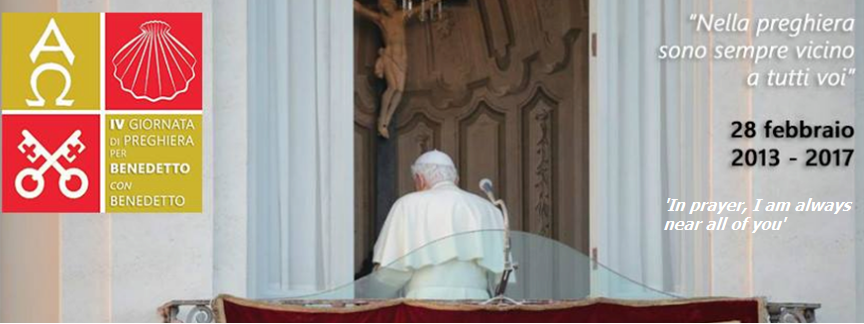 Thanks once again to Scenron of La Vigna del Signore for his annual prayer initiative - with and for Benedict XVI - on the anniversary of the day he stepped down as Pope.
Thanks once again to Scenron of La Vigna del Signore for his annual prayer initiative - with and for Benedict XVI - on the anniversary of the day he stepped down as Pope.



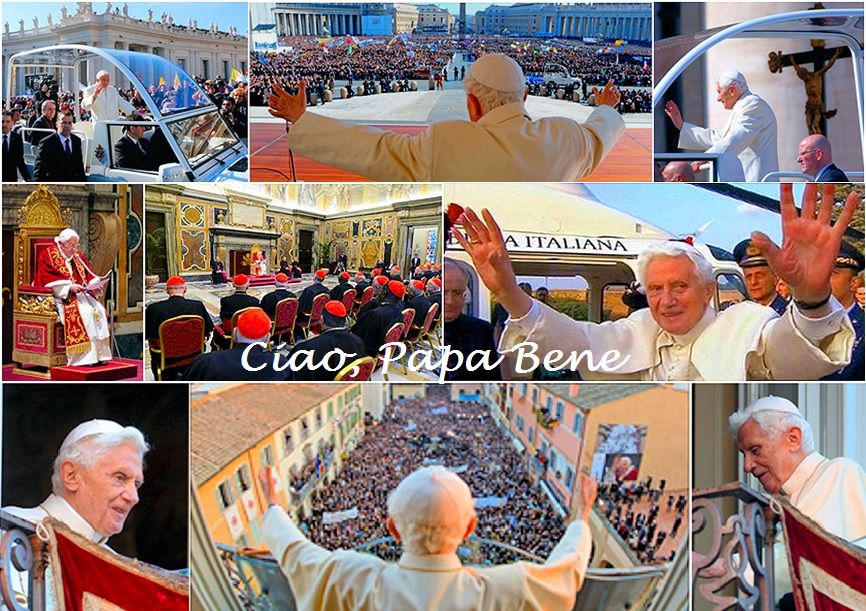 Leaving the Vatican Apostolic Palace for the last time
Mons. Gaenswein's emotions may have best approached our own at this poignant end to the pontificate of Benedict XVI. [And yet, he will continue to be the closest person to our Papa Bene - and long may he continue to care for him so lovingly.]
Leaving the Vatican Apostolic Palace for the last time
Mons. Gaenswein's emotions may have best approached our own at this poignant end to the pontificate of Benedict XVI. [And yet, he will continue to be the closest person to our Papa Bene - and long may he continue to care for him so lovingly.]
Many Italian newspapers took the time to capture these images from the brief video that showed Benedict XVI getting out of the elevator from the papal apartment to the narrow hallway that leads to the San Damaso entrance of the Apostolic Palace yesterday afternoon. This series came from Corriere della Sera which entitled it 'Padre Georg si e commosso' (Padre Georg is moved to tears)...
Mons. Georg
is moved to tears
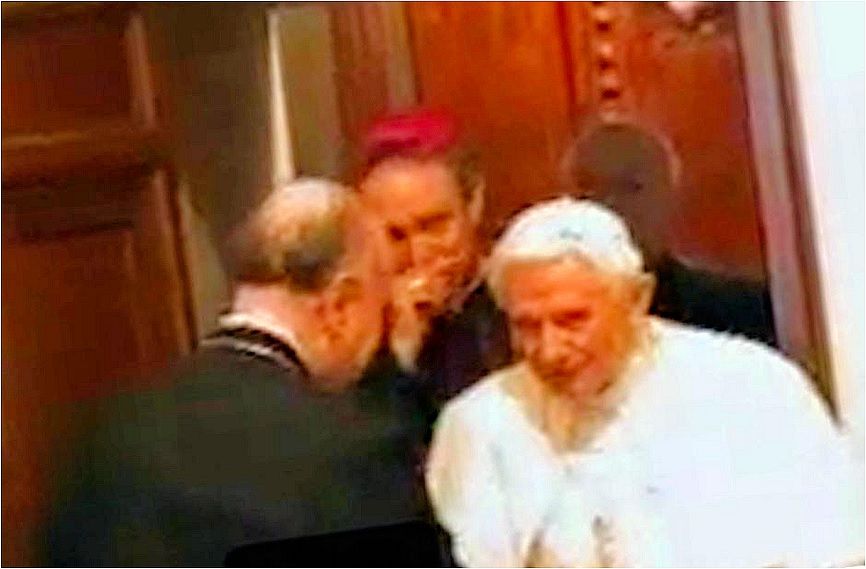
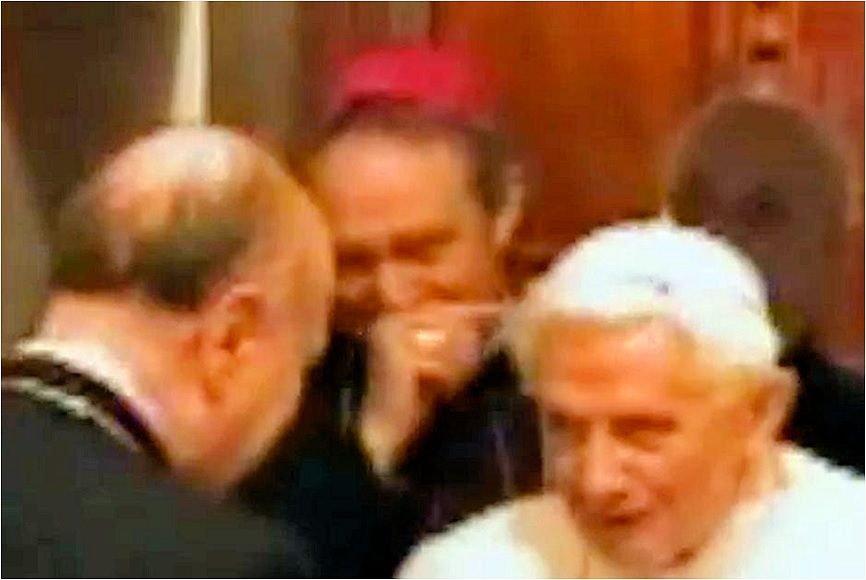
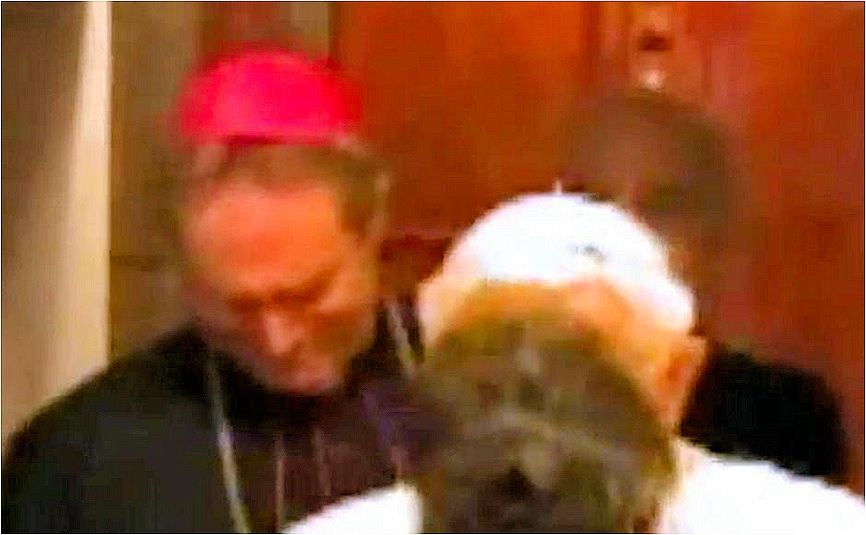
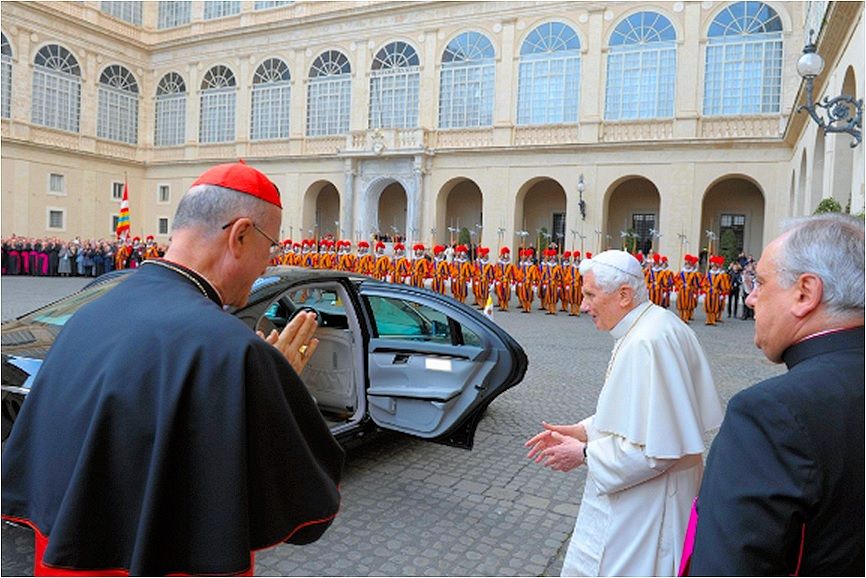
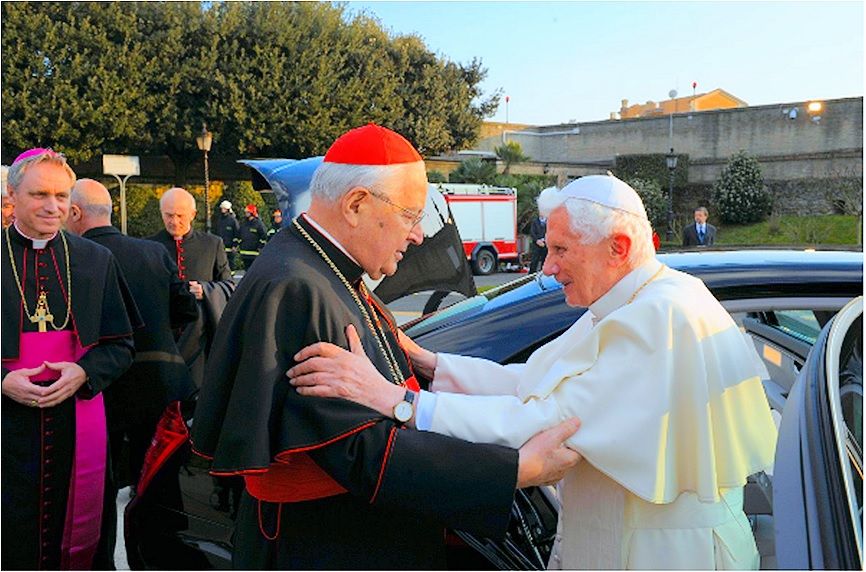
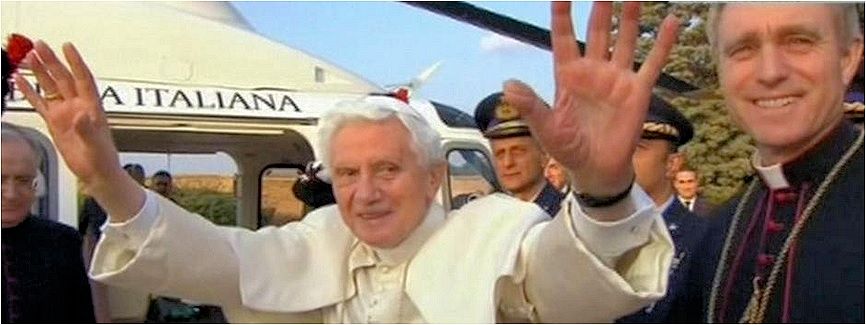
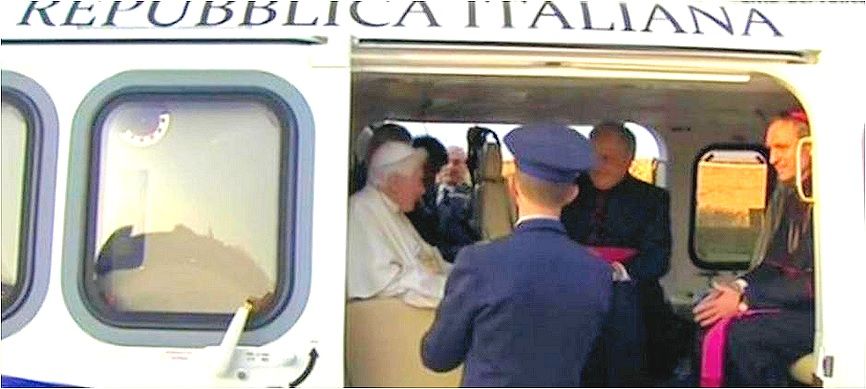
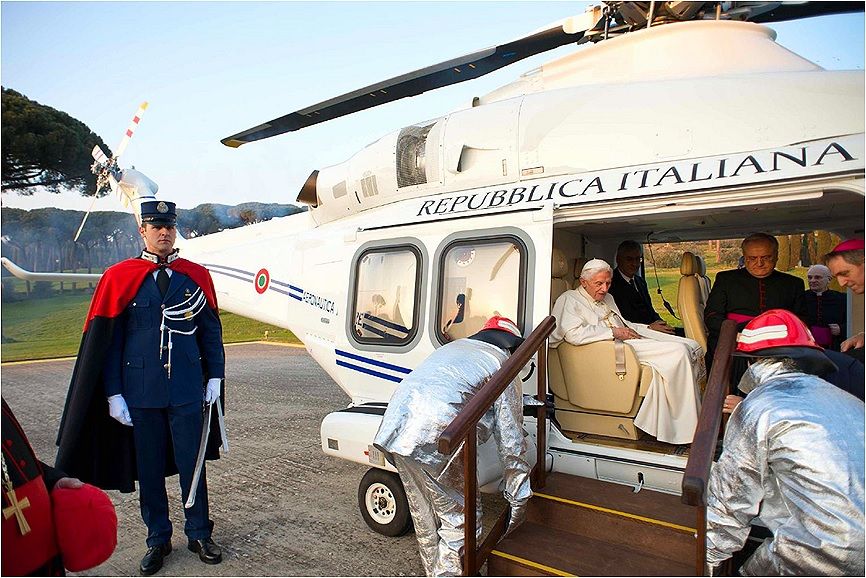

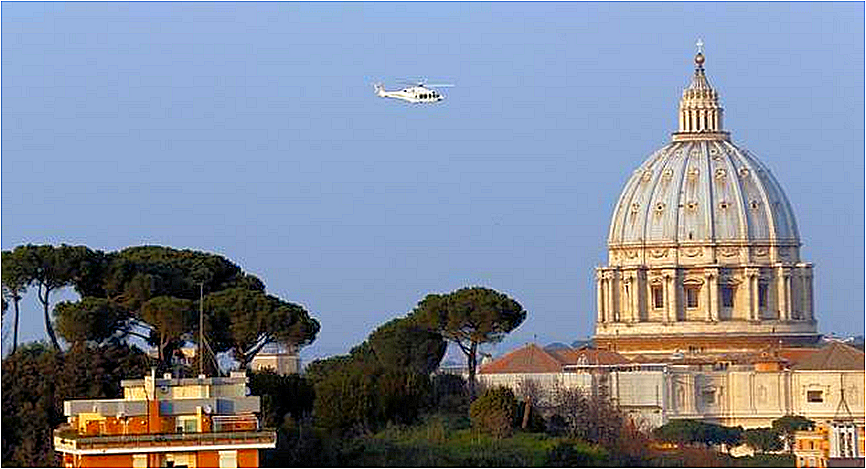 At Castel Gandolfo
At Castel Gandolfo

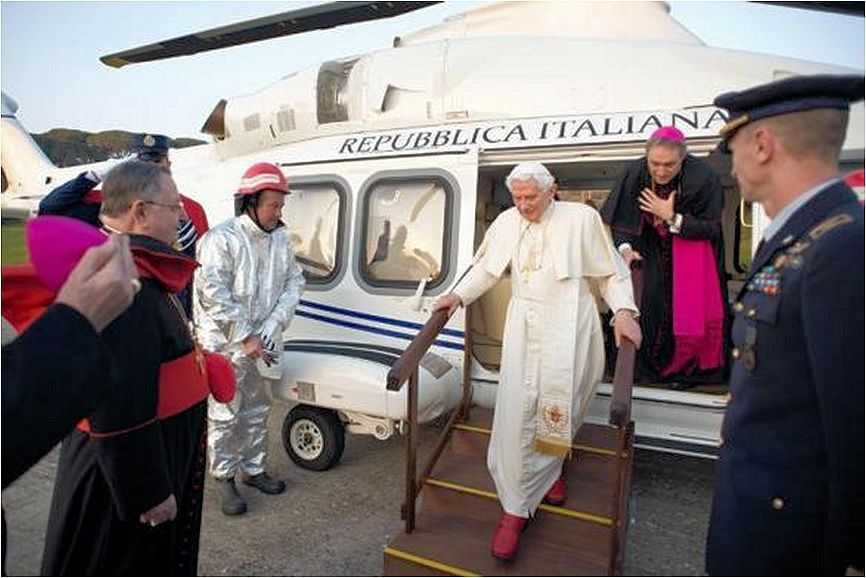 His last event as Pope
His last event as Pope
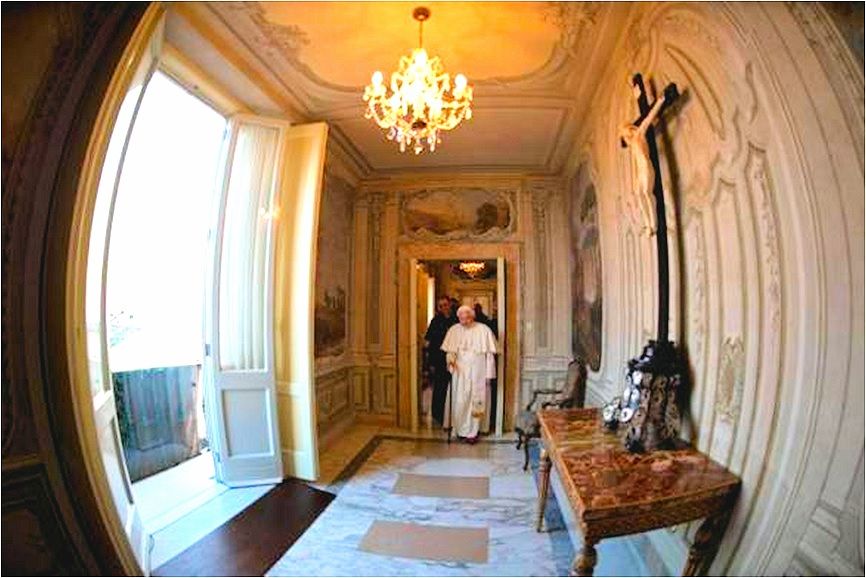
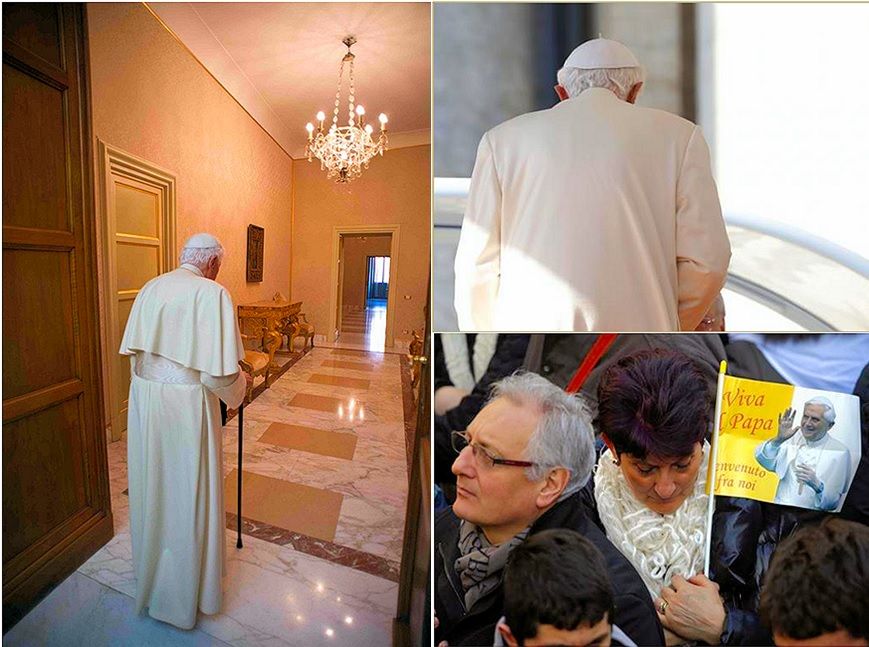
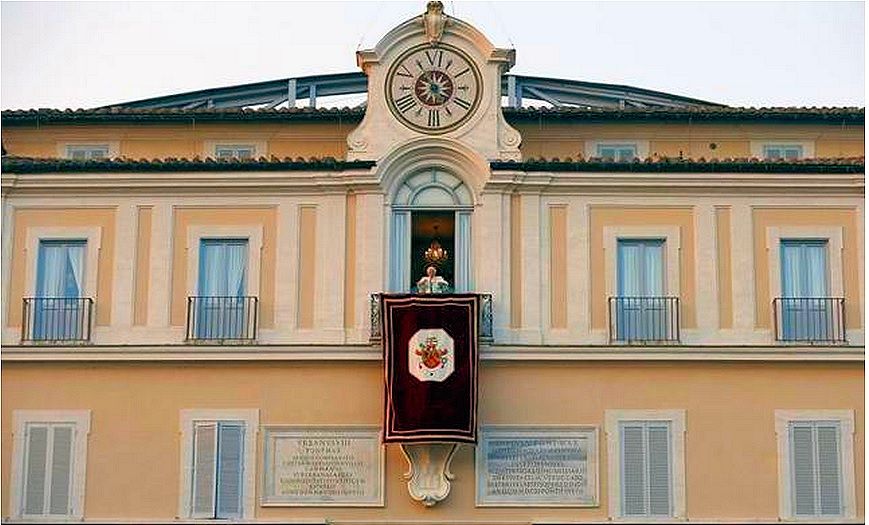
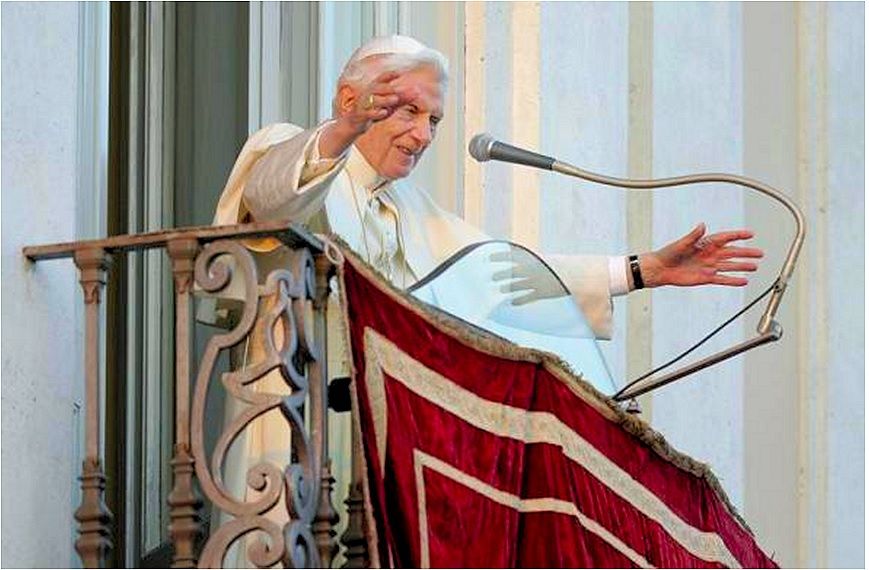
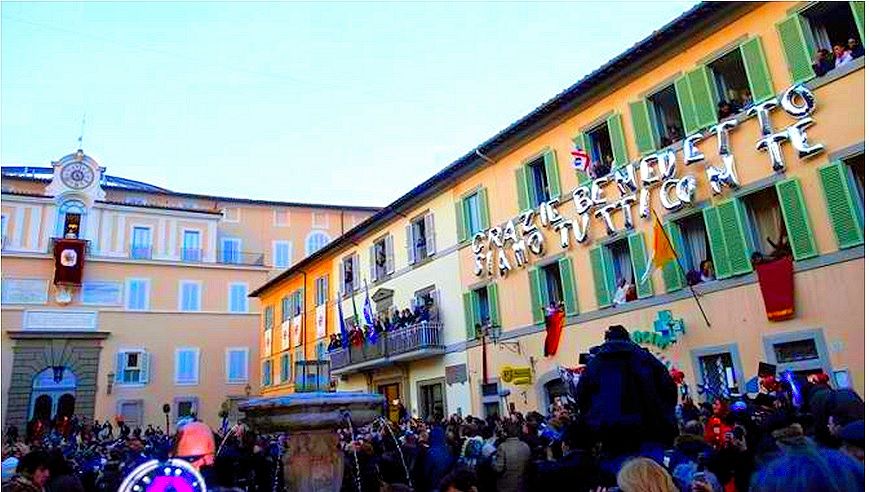
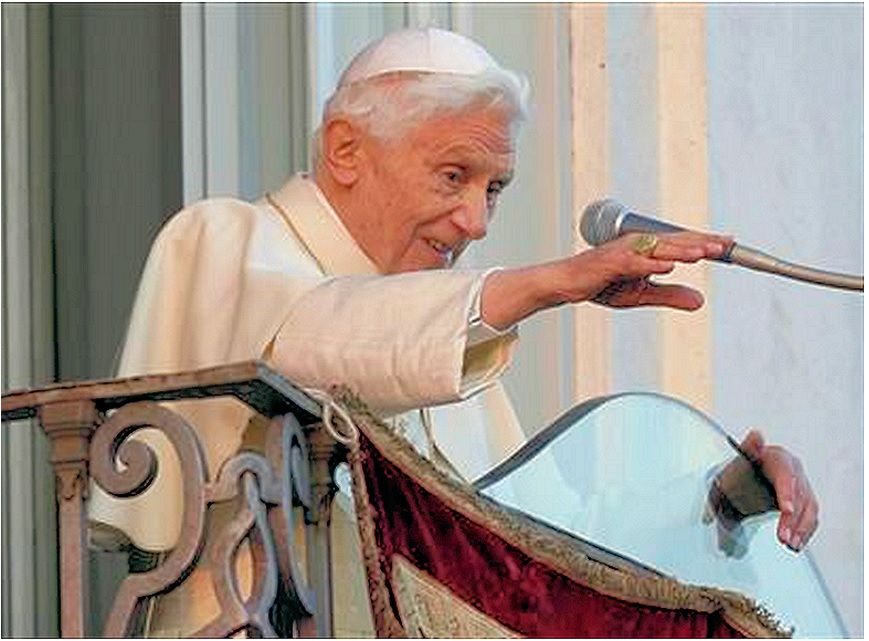
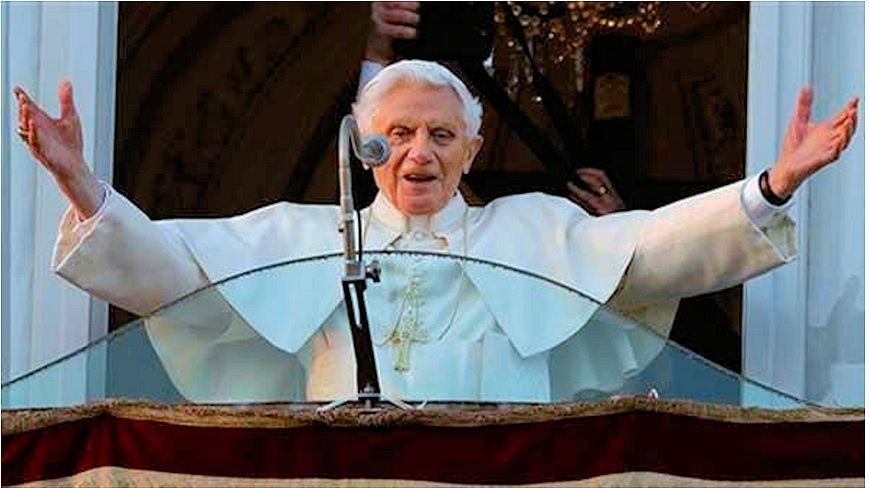
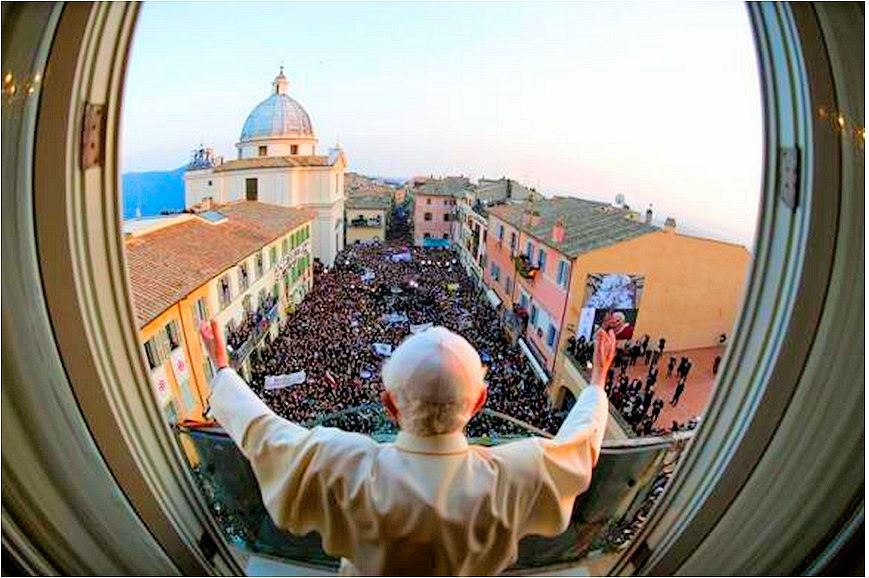
His last words to the faithful
as the Successor of Peter
Thank you. Thank you all.
Dear f riends, I am happy to be with you, surrounded by the beauty of Creation and your kindness, which does me so much good. Thank you for your friendship and your affection.
You know that this day is different for me from the preceding ones. I am no longer the Supreme Pontiff of the Catholic Church, or I will be until 8:00 this evening and then no longer. I am simply a pilgrim beginning the last leg of his pilgrimage on this earth.
But I would still... thank you... I would still — with my heart, with my love, with my prayers, with my reflection, and with all my inner strength — would like to work for the common good and the good of the Church and of humanity. I feel greatly supported by your kindness.
Let us go forward with the Lord for the good of the Church and the world. Thank you. I now wholeheartedly impart my blessing.
May Almighty God bless us, Father, Son, and Holy Spirit.
Good night! Thank you all!
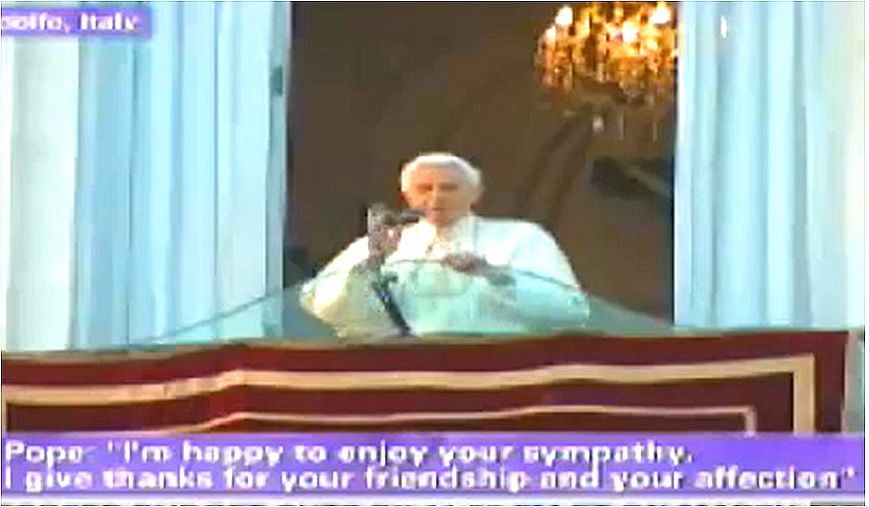


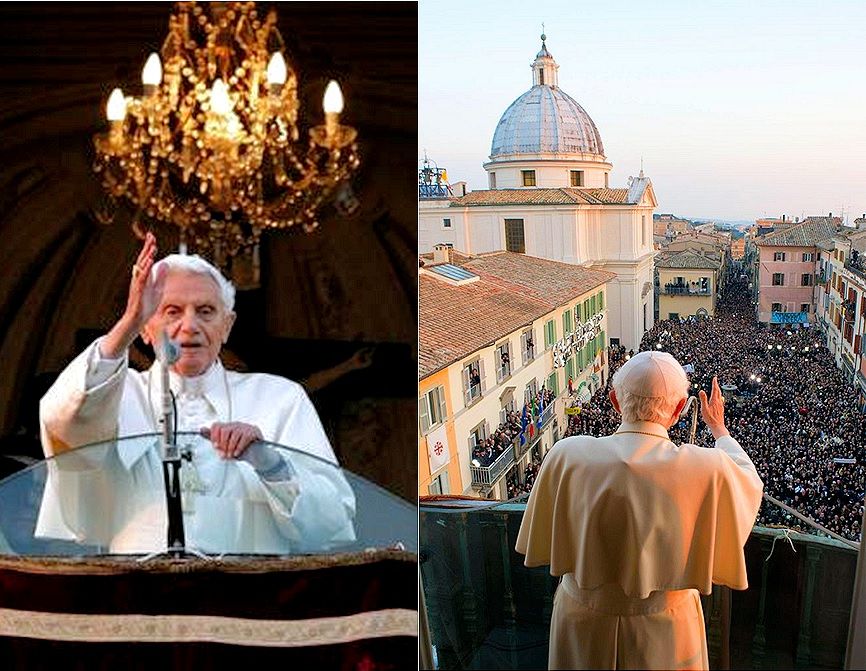
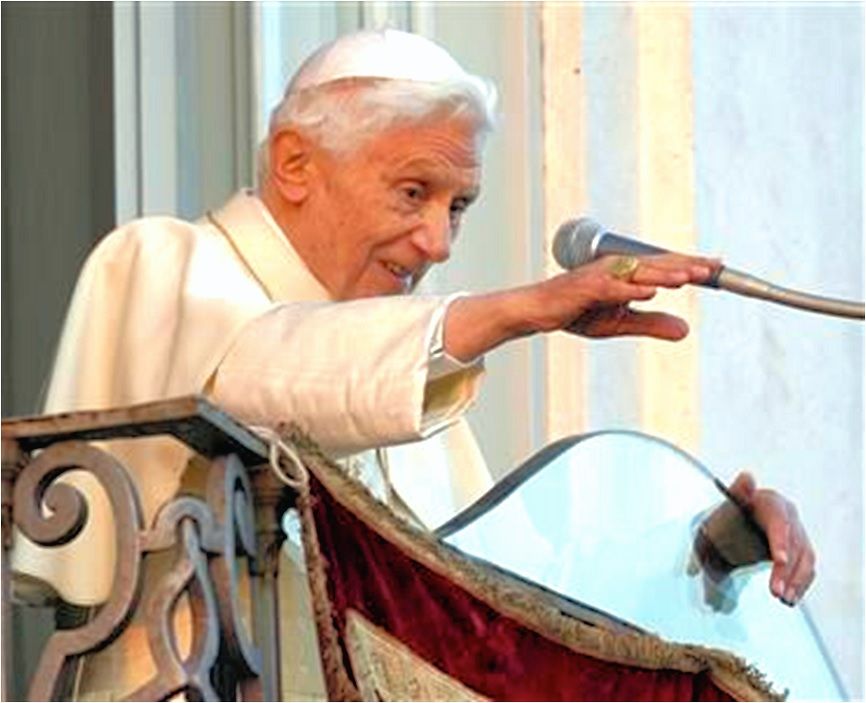
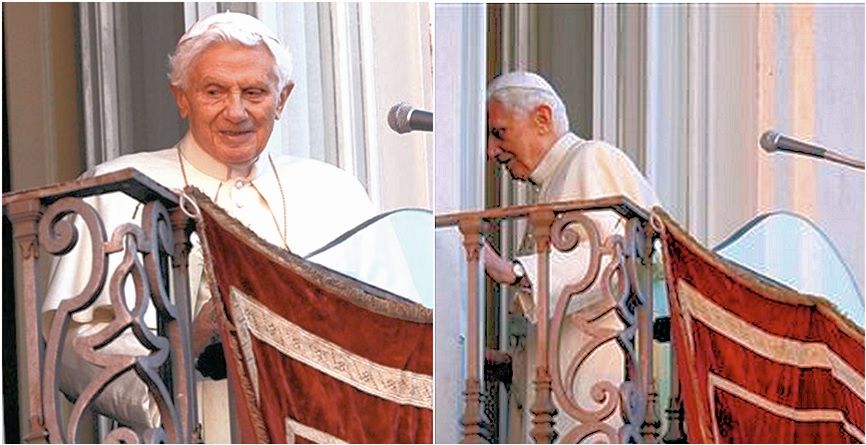
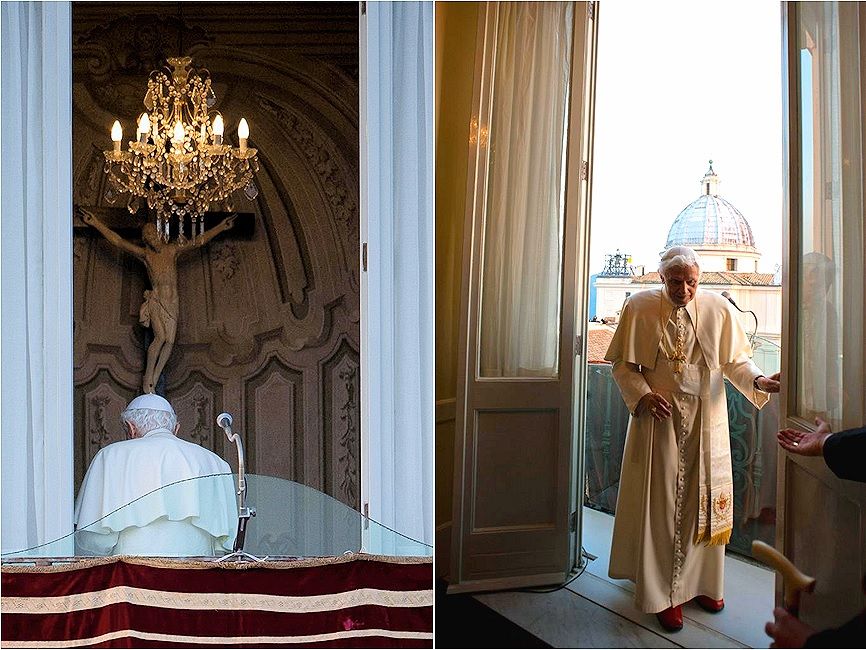
Our last glimpse of him, till who knows when?
At 8:00 PM, the bells ring the hour, the Swiss Guard lay down their arms and go off duty, and the doors of Castel Gandolfo are closed. The Pontificate of Benedict XVI is over after seven years, ten months, nine days, and two hours...

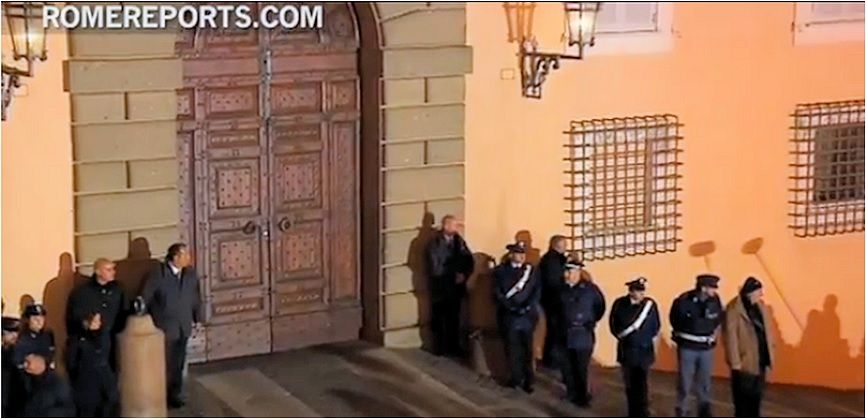 Formalities at the Vatican
Formalities at the Vatican
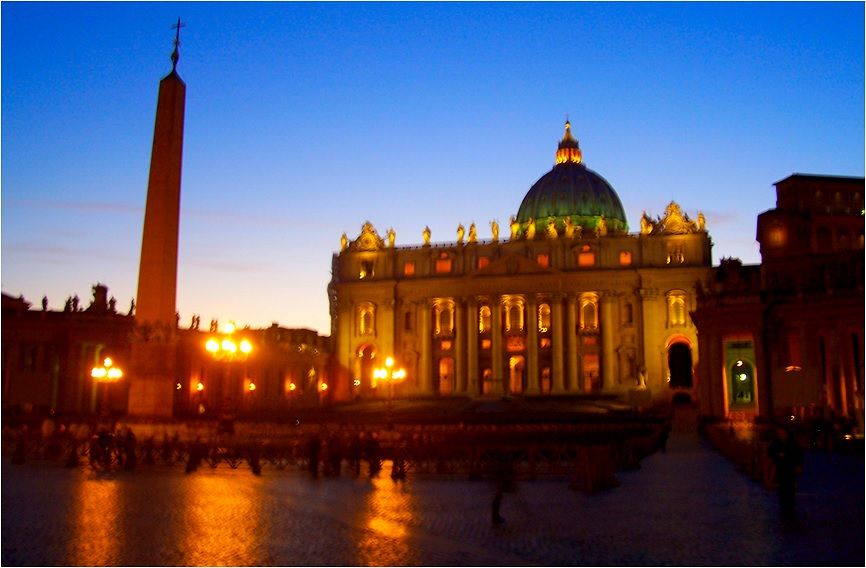
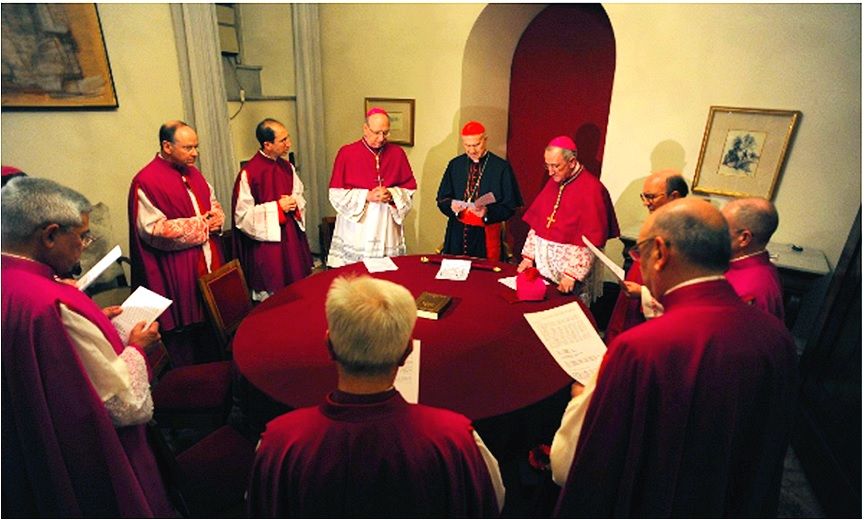
Cardinal Bertone, as Papal Chamberlain (Camerlengo), convenes his Apostolic Commission for the first time and proceeds to lock and seal the papal apartment in the Apostolic Palace.
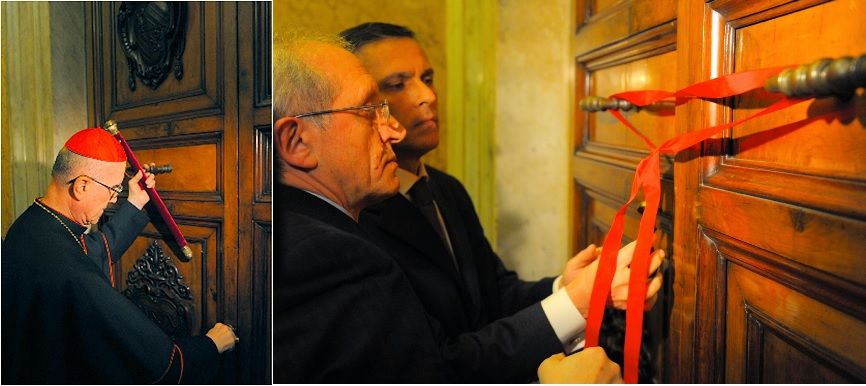 LIGHTS OUT
LIGHTS OUT
The See of Peter is vacant
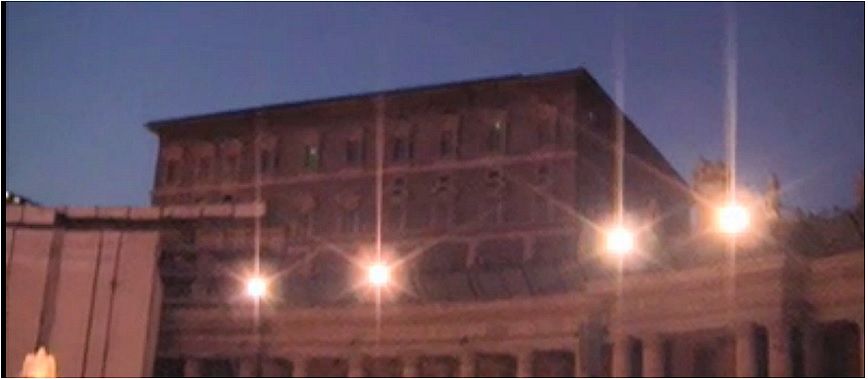
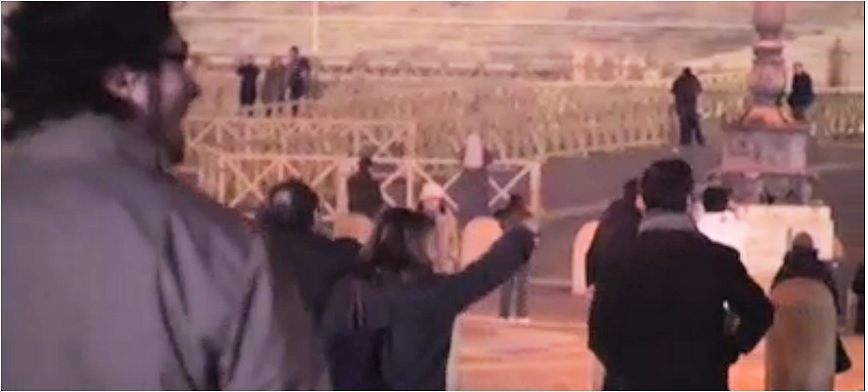
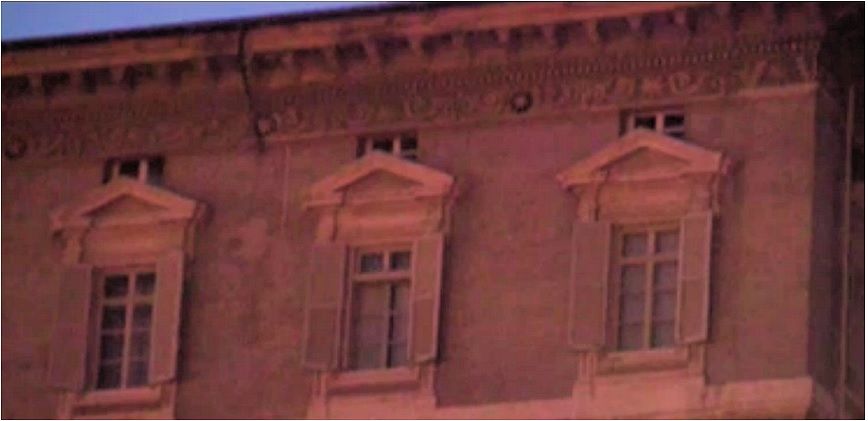 A brief but moving video from RAI sums up the poignancy of the last day:
A brief but moving video from RAI sums up the poignancy of the last day:
www.rainews24.rai.it/it/video.php?id=32725
On his last day as Pope,
Benedict’s character shone through
by EDWARD PENTIN

VATICAN CITY, March 1, 2013 — Benedict XVI’s final moments as Pope yesterday were in keeping with his simple, understated character.
There was no drama, no long speeches or self-indulgence — simply an acceptance of a reality and a prevailing sense of trust that Christ is at the heart of the Church, sentiments Benedict expressed to cardinals earlier in the day.
As dusk fell at the end of a second day of unseasonably beautiful weather in Rome, a medium-sized crowd had gathered in St. Peter’s Square to follow the Pope’s departure on large video monitors. Almost no voices could be heard, and, apart from the whirring of a police helicopter overhead, the square was unusually silent, even somber.
But shortly before 5pm, cheers erupted as the screens on the square began showing the Pope walking slowly through the corridors of the Apostolic Palace with the aid of a cane. He was accompanied by his closest aides.
On emerging into the San Damaso courtyard, he greeted staff from the Secretariat of State, saying farewell to Cardinal Tarcisio Bertone, the Vatican secretary of state, and a number of other senior officials.
The bells of St. Peter’s Basilica and other churches began to peal as the Holy Father was driven the short distance to the Vatican helipad, where he said a final farewell to Cardinal Angelo Sodano, dean of the College of Cardinals, Cardinal Giovanni Lajolo, president emeritus of the governorate of the Vatican city state, and heads of the Vatican police. One more final wave, and the Pope boarded the Italian military helicopter for the 15-minute flight to Castel Gandolfo.
[Was I imagining it or did those Roman bells peal for at least 15 minutes, during the entire length of the helicopter flight to Castel Gandolfo? Bells speak - they either peal for joy or toll for grief. I heard them as a celebration of this exceptional man, a living saint and future Doctor of the Church, and his brief but great Pontificate. I think they pealed longer yesterday than they did when he was elected Pope.]
Accompanying Benedict on his final journey as Pope were his personal secretaries Archbishop Georg Gänswein and Msgr. Alfred Xuereb; along with Msgr. Leonardo Sapienza, the deputy prefect of the papal household; Dr. Patrizio Polisca, the pope’s personal physician; and Sandro Mariotti, Benedict’s butler.
[VALET! Will you guys never learn???]
As the chopper gently lifted off, it then quickly gained altitude and took a circuitous route around Rome to give as many people as possible a chance to say their own farewells. As it flew over St. Peter’s Square, several thousand well-wishers cheered and waved one last time.
Among those present in the square was Cardinal Seán O’Malley, the archbishop of Boston.
“It’s very moving to see how much this man is loved and will be missed,” he said. “It’s a beautiful gesture these people have shown to come here and personally bid him farewell.”
Followed by a second helicopter, operated by a Vatican television crew, everyone, including those in the square watching on large screens, was able to follow the Pope’s entire journey as it flew low into the hazy, yellow-ochre sunset, over the Colosseum and the many other ancient landmarks of Rome.
Many praised the footage of the event, managed by the new director of Vatican television, filmmaker Msgr. Edoardo Vigano. The coverage was “tremendous,” Vatican spokesman Father Federico Lombardi, said today, “because they involved us and the whole world in the beautiful story that unfolded yesterday. … We’re very grateful to them for what they did.”
On arrival in Castel Gandolfo, the Pope was driven the short distance from the helipad to the Apostolic Palace, where a crowd of 7,000 people were waiting to greet him. Minutes later, he appeared on the balcony and thanked the throng.
“I am happy to be with you, surrounded by the beauty of creation and your sympathy that does so much good for me. Thank you for your friendship and love,” the Pope said at around 5:30pm from the balcony of his villa.
“You know that today is different than previous ones. I’m no longer the pope. Until 8pm I am, but then, afterwards, I am no longer Pope of the Catholic Church,” he said.
Benedict then offered a window into how he sees this stage of his life.
“I’m simply a pilgrim who is starting the last stage of his pilgrimage on earth,” he remarked, “but I would still like with my heart, with my love, with my prayer, with my reflection, with all my inner strength to work for the common good of the Church and of humanity, and I feel very supported by your sympathy."
“Let’s go ahead together with the Lord for the good of the Church and of the world,” he said as he finished his brief greeting.
Pope Benedict XVI then gave his last papal blessing to the crowd.
“Thank you. And now I impart to you the Lord’s blessing with my whole heart. May God bless you, Father, Son and Holy Spirit. Thank you and good night. Thanks to all of you.”
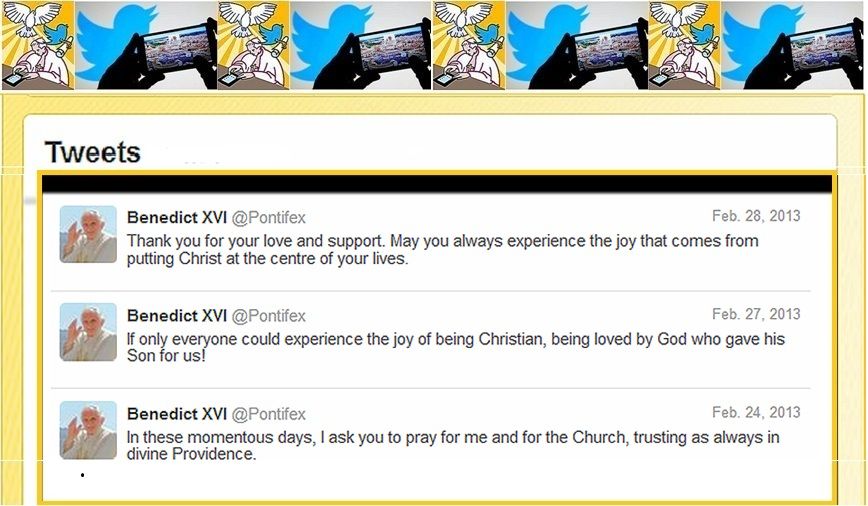 The last tweets.
The last tweets.
Michael Severance, a resident who watched the events unfold, said the mood in the Bernini-designed town square of the papal summer residence “was anything but sullen.”
“The vibe was actually electric: A few thousand of us rushed over from the nearby town of Albano after 5pm and chanted in rhythm Be-ne-det-to! one last time as the helicopter swirled above our heads,” he recalled. “Other locals sounded loud musical instruments, waved flags and hoisted banners of affection. And we all brought rosaries and other religious objects for one last blessing.”
“It was an arrivederci fit for a king,” he said.
At 8pm Rome time, a loud bell then rang eight times. The crowd shouted Viva il Papa! (“Long live the Pope!”). The Swiss Guards entered Castel Gandolfo and hung up their ceremonial halberds on the inner walls, as there is no longer a sitting pope for them to protect.
They then closed the two large doors and bolted them shut, symbolizing the definitive end of Pope Benedict XVI’s pontificate.
The Swiss Guards departed, and three Vatican gendarmes dressed in black uniforms marched to the inside of the gates, stood guard and saluted.
Witnessing such an historic and momentous moment will be unforgettable for many of those present.
“Even the small children, including three of my own, were aware of the historic moment,” said Severance, who works at the Acton Institute in Rome. “Many of our families would see him several times from July to October in the intimacy of his courtyard on Sundays and have their bambini blessed by Benedict.”
“We will all dearly miss him as our summer neighbor for the last eight years,” he added. “This was the only pain we felt, while happy and confident in his decision to retire to prayer and study.”
Reflecting on how he thought Benedict XVI will be remembered, Cardinal O’Malley told the
Register,
“As Benedict the teacher, the man who was able to break open the word of God for all of us in such a wonderful way and touch our hearts with the message of the Gospel.” [P.S. 2014 Probably the last time the good cardinal ever had a good thought about B16!]



 PRAY FOR AND WITH BENEDICT XVI!
It has not become easier - in fact, it gets more difficult by the day - to live with the fact that Benedict XVI is no longer the reigning Pope, though we are grateful to the Lordvthat he continues to be with us. However, his toughest critics today, some of whom were previously great admirers, do not miss an occasion to blame him witheringly and mercilessly for the woes of the Church today, since his resignation opened the way for Jorge Bergoglio to become the pope and the consequent disaster for the Catholic faith that he is strewing right and left.
PRAY FOR AND WITH BENEDICT XVI!
It has not become easier - in fact, it gets more difficult by the day - to live with the fact that Benedict XVI is no longer the reigning Pope, though we are grateful to the Lordvthat he continues to be with us. However, his toughest critics today, some of whom were previously great admirers, do not miss an occasion to blame him witheringly and mercilessly for the woes of the Church today, since his resignation opened the way for Jorge Bergoglio to become the pope and the consequent disaster for the Catholic faith that he is strewing right and left.
Yet for all his prophetic instincts, he admits he was very surprised that the cardinals chose Bergoglio to succeed him, and one imagines he had felt confident that after him, someone like Scola or Ouellet or even Erdo of Hungary - i.e., known orthodox Catholic stalwarts - would be chosen pope.
The Holy Spirit has imposed a great burden on him as emeritus pope, who promised he would live the rest of his days praying for the Church, because, IMHO, the Bergoglian crisis is far worse for the Church than the Arian crisis ever was because its principal culprit happens to be pope, with all the considerable powers and prerogatives he is able to deploy to serve his will and every whim. I pray daily not just for Benedict XVI but also for his intentions, because who better than he could articulate the most urgent needs of the Church today?
Ad multos annos, Benedicte, and all our love and prayers.
TERESA BENEDETTA
00giovedì 2 marzo 2017 05:51
March 1, 2017 headlines
For once, both news aggregators chose the same item as their big bold banner for the day - what is the first of doubtless many assessments to be published in the next two weeks approaching the fourth anniversary of what the first of the Canon212 links
below calls 'this disastrous papacy'...
Canon-212.com
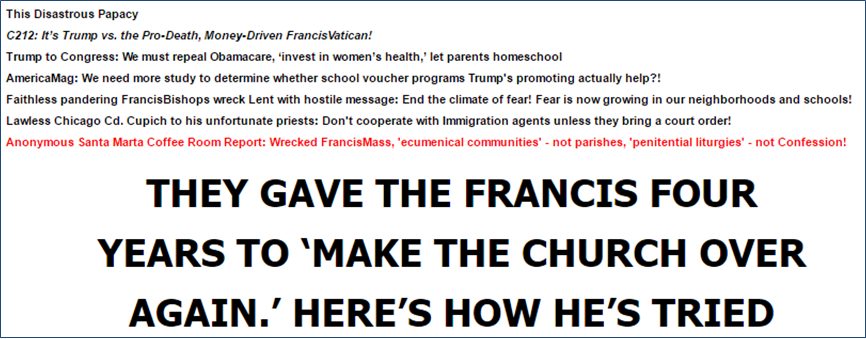 PewSitter
PewSitter
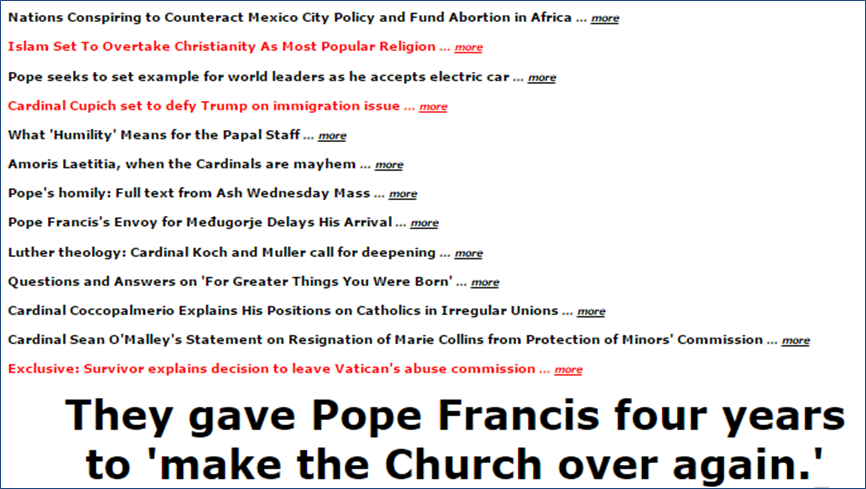
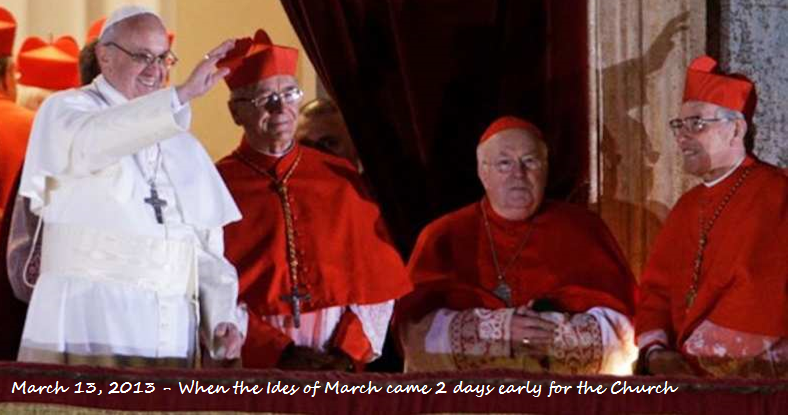 To the left of the new pope, Cardinal Hummes of Brazil and Cardinal Danneels of Belgium.
His Grand Electors gave Jorge Bergoglio
To the left of the new pope, Cardinal Hummes of Brazil and Cardinal Danneels of Belgium.
His Grand Electors gave Jorge Bergoglio
four years to ‘make the Church over again’
[But he's giving them a new church they did not
even dare dream in their wildest fantasies]
by Pete Baklinski

March 1, 2017 (LifeSiteNews) - Four years ago, on March 13, 2013, an unknown Argentine cardinal was elected to lead the Catholic Church. The election of Jorge Mario Bergoglio followed upon years of clear, solid, orthodox teaching under the distinguished pontificates of Saint John Paul II (1978-2005) and Benedict XVI (2005-2013).
As white smoke emanated from the Sistine Chapel chimney that March evening, signifying the election of a new pope, faithful Catholics around the world were eager to see who their next leader would be. They did not know, nor could they possibly have known, the massive shake-up that awaited them.
However, a number of high-ranking prelates did know. Some even let it slip following the election that an influential group of liberal-minded cardinals had been in existence with the goal of influencing the conclave to elect Bergoglio. One cardinal even said he was part of the group. He referred to it as a “mafia.”
It was Cardinal Godfried Danneels of Belgium, honored with standing alongside Pope Francis on the balcony on the night of his election, who revealed the existence of the St. Gallen group. It was Danneels who called it a "mafia" on account of its goal to drastically reform the Church to make it "much more modern."
The informal group came into existence sometime around 1996. Members, which included Cardinals da Cruz Policarpo, Martini, Danneels, Murphy-O'Connor, Silvestrini, Husar, Kasper, and Lehmann, thought they could have a “significant impact” on future papal elections if each of them used their network of contacts, according to Danneels’ authorized biography, co-written by Jürgen Mettepenningen and Karim Schelkens.
The group allegedly lost its impetus in 2006 after failing to have their preferred candidat [Bergoglio] elected in the 2005 conclave. While the group has been accused of being involved in
a plot that led to the resignation of Pope Benedict, [Does anyone really take these far-out conspiracy theories seriously at all?] these claims have been denied by the former bishop of St. Gallen Ivo Fürer.
But while Bishop Fürer stated that the St. Gallen group did not officially meet after 2006, and therefore could not have been involved in a plot to force Benedict XVI to resign, this does not mean that the group was inactive.
According to Austen Ivereigh, Francis’s biographer and Cardinal Cormac Murphy-O'Connor’s former assistant, in the days prior to the March 12 conclave in Rome, Murphy-O’Connor was tasked by the St. Gallen “mafia” with informing Bergoglio of their plan to get him elected. Murphy-O’Connor was an old friend of Bergoglio.
As Ivereigh described in his 2014 book on Pope Francis, Murphy-O’Connor was also tasked with lobbying for Bergoglio among his North American counterparts as well as acting as a link for those from Commonwealth countries. Ivereigh wrote:
“They first secured Bergoglio’s assent. Asked if he was willing, he said that he believed that at this time of crisis for the Church no cardinal could refuse if asked. Murphy-O’Connor knowingly warned him to 'be careful,’ and that it was his turn now, and he answered 'Capisco’ – 'I understand.’
“Then they got to work, touring the cardinals’ dinners to promote their man, arguing that his age – 76 – should no longer be considered an obstacle, given that popes could resign. Having understood from 2005 the dynamics of a conclave, they knew that votes travelled to those who made a strong showing out of the gate".
Because he was over the age of 80, Murphy-O'Connor was not able to vote in the Conclave, but was present at the pre-Conclave gatherings. On March 2, an anonymous cardinal who was not able to vote in the conclave told the Italian newspaper
La Stampa that,
“Four years of Bergoglio would be enough to change things.” Murphy-O'Connor was later named making the same comment in a July 2013 piece that appeared in the
Independent.
[And Bergoglio's good friend and Conclave seatmate Cardinal Hummes of Brazil said at around the same time, "He thinks he can change the Church in four years". As did Bergoglio's eminence grise in Argentina, Mons. Victor Fernandez. Both attributing the four-year deadline to Bergoglio himself.]
So in the days before the Conclave, word began to get around quickly in the College of Cardinals that a powerful movement was afoot to elect Bergoglio.
[The greatest mystery of the 2013 Conclave - which no one has yet bothered to explain is how all this movement afoot for Bergoglio managed to be completely under the media radar that not even those who would quickly emerge as his first card-carrying idolators in the media - Andrea Tornielli and the husband-and-wife team of Stefania Falasca and Gianni Valente (personal friends for years of Bergoglio, who would have dinner at their home every time he came to Rome) - even so much as considered him among the top papabile!]
In an astounding talk given six months after Bergoglio’s election, Cardinal Theodore McCarrick, Archbishop Emeritus of Washington, D.C., revealed how he became part of the plan to elect the new pope.
“Before the Conclave, nobody thought that there was a chance for Bergoglio,” he said in an October 1, 2013 talk given at Villanova University in Philadelphia, Pennsylvania.
McCarrick, who like Murphy-O'Connor, was too old to vote in the 2013 conclave, said that prior to the event a “very interesting and influential Italian gentleman” visited him at the American College in Rome where he was staying, to ask him to campaign for Bergoglio. The conversation, as related by McCarrick, must be quoted at length to reveal its significance.
We sat down. This is a very brilliant man, a very influential man in Rome. We talked about a number of things. He had a favor to ask me for [when I returned] back home in the United States.
But then [the influential Italian] said, ‘What about Bergoglio?’
And I was surprised at the question. I said, ‘What about him?’
He said, ‘Does he have a chance?’
I said, ‘I don't think so, because no one has mentioned his name. He hasn't been in anyone's mind. I don't think it’s on anybody's mind to vote for him.”
He said, ‘He could do it, you know.’ I said, ‘What could he do?’
He said, ‘[Bergoglio] could reform the Church. If we gave him five years, he could put us back on target.’
I said, ‘But, he’s 76.’ He said, ‘Yeah, five years. If we had five years, the Lord working through Bergoglio in five years could make the Church over again.’ I said, ‘That’s an interesting thing.’ He said, ‘I know you’re his friend.’ I said, ‘I hope I am.’
He said, ‘Talk him up.’ I said, ‘Well, we'll see what happens. This is God’s work.’
That was the first that I heard that there were people who thought Bergoglio would be a possibility in this election.
McCarrick went on to say in his talk that
when his time came to speak to all the cardinals prior to the vote, he urged them to elect someone from “Latin America” who could identify with the poor.
He then went on in his talk to praise Pope Francis to the American Catholic students as a “pastor” greater than previous popes. “I think we have maybe never had a ‘pastor’ in so long a time,” he said.
He continued: “[Francis] has an understanding of human nature, an understanding that, though he says some things that maybe would surprise us, but the interesting thing is that if you examine what he is saying, it is what the Church has said all the time. Maybe not what the canonists have said all the time, or what different theologians have said all the time. But the teaching of the Church all the time is the teaching of Pope Francis.”
McCarrick predicted at that time that Francis “if he has two years, he will have changed the papacy.”
“The longer he is in, the more I think it is likely that we could say that he has changed the papacy,” he stated.
[My, my! For someone who, before getting a visit from the Bergoglio pusher, never even thought of Bergoglio as papabile, McCarrick surely turned true believer overnight, mouthing all the myths and talking points that Bergoglio's Grand Electors used to push his candidacy and which have lived on in the media narrative about this pope.]
What liberal prelates like McCarrick, Murphy-O'Connor, and Danneels knew about Bergoglio’s capacity to “make the Church over again” has only slowly and confusedly become evident to faithful Catholics over the last four years, but especially in the last year.
Based on a mistaken notion of papal infallibility, many Catholics have defended Pope Francis to the point of absurdity. But sober-minded Catholics who know the Church's traditional teachings, history, and practices, are alarmed at the clear fact that many of the Holy Father’s actions and statements are at odds with what has gone before.
In Bergoglio’s four years as Pope, the four marks that set the Catholic Church apart from every other religion on the face of the earth, namely that she is One, Holy, Catholic, and Apostolic, have become obscured and even undermined.
The oneness or unity of the Church in her submission to Christ as head, in her doctrinal integrity, and in her confession of one faith has been obscured and undermined in various ways under Francis’s pontificate:
- He has called for a “decentralized” Church, and allowed individual bishops’ groups to determine for their own “regional” churches what is moral and right. In this way, it is supposedly permissible for adulterers to receive Holy Communion in Germany while across the border in Poland it is gravely sinful.
- His ambiguous speeches and especially his papal writings have turned cardinal against cardinal, bishop against bishop, and lay-faithful against lay-faithful.
- He has refused to answer Church leaders earnestly begging for clarity on points of contention.
- He has allowed Catholic doctrine to be minimized in the name of religious “dialogue” with other Christian denominations with a history of hostility towards Catholic doctrine on marriage, the Eucharist, and the papacy.
- Under his leadership, the Vatican has even hailed Luther, the founder of Protestantism, as a “witness to the gospel.”
The holiness and sacred reality of the Church as the bride of Christ has been obscured and undermined in various ways under Francis’s pontificate:
- His writings have been used by those closest to him to promote evil practices such as adultery and fornication as legitimate moral choices.
- His writings have also been used to defend the sacrilegious practice of giving Holy Communion to those living in objective grave sin (here, here, here, and here). Bishops and cardinals have defended this sacrilegious practice based on the Pope’s own arguments in Amoris Laetitia that emphasize “pastoral care” and “mercy” to the detriment of doctrine and truth.
- He has denounced “restorationist” orders bursting with young people and has destroyed one traditional order.
- He has resisted the traditional Latin Mass and called the young people attracted to it “rigid”
[or simply being faddish].
- He has accused Christians of “cowardliness” who zealously follow the Ten Commandments.
- He has consistently used coarse and degrading language to criticize and vilify those with whom he disagrees (here, here, and here).
- He has allowed St. Peter’s Basilica, a sacred Church building, to be desecrated by an ultra-secular light show projected on its facade.
- He has allowed sexually provocative dance troupes to perform on the steps of St. Peter’s Basilica.
He has allowed the desecration of the Sistine Chapel by renting it - out to the Porsche car company for a corporate event and has allowed it to be used as a venue for U2’s guitarist ‘The Edge.’
The Catholicity or universal mission of the Church to ceaselessly toil for the salvation of souls has been obscured and undermined in various ways under Francis’s pontificate:
- He has oriented the Church’s mission towards worldly goals such as combatting climate change and reordering the world’s economic system.
- He has called Catholics to have an “ecological conversion” and to repent of “sins” against the environment.
- He has allowed the sworn enemies of the Church to openly exert their influence on her policies and programs.
The apostolicity of the Church where the deposit of faith is authentically handed down from the apostles through their successors the bishops and cardinals has been obscured and undermined in various ways under Francis’s pontificate:
- He has elevated openly heretical bishops and cardinals who do not hold the unchanging faith as handed down through the ages from the Apostles.
- He has demoted and silenced high-ranking voices of orthodoxy within the Church.
- He has created an environment that allows bishops and cardinals and other prominent Church leaders to openly depart from perennial Church teaching and moral absolutes
[following his example and emboldened by it].
In his October 2013 speech to the Catholic students of Villanova University, Cardinal McCarrick ended his panegyric of Pope Francis by comparing him to the “Pied Piper of Hamelin.”
“He will walk across the stage of the world and people will follow him. They will find in him like they found in the Pied Piper of Hamelin, they will find in him a certain charism, that reminds them that this is what God's love is all about. And this is what Francis is all about,” he said.
McCarrick surely didn’t realize how disturbing the comparison was. According to the children’s tale, when the town’s families refused to pay the piper for ridding them of a rat infestation, he took his revenge by using his pipe on their children. Enchanting them with his charism and delightful tunes the piper led them away into a secret mountain cave and they were never seen again.
If, as McCarrick said, Bergoglio is the Pied Piper, perhaps fewer would have followed his tune if they had known where it would lead them.
But one Argentinian journalist who knew Bergoglio well warned the world on the day of his election what kind of tune the new pontiff piper was about to play. These words posted online at Rorate Caeli on March 13, 2013, the day of the election of Pope Francis, are so on the mark
one might suspect that the journalist had somehow managed to time travel four years ahead from that date to today so as to accurately depict what was about to unfold.
The day Bergoglio was elected, Argentinian journalist Marcelo González of Panorama Católico Internacional wrote that he was “terrified” for the future of the Catholic Church. It is worth quoting the post in its entirety:
Of all the unthinkable candidates, Jorge Mario Bergoglio is perhaps the worst. Not because he openly professes doctrines against the faith and morals, but because, judging from his work as Archbishop of Buenos Aires, faith and morals seem to have been irrelevant to him.
A sworn enemy of the Traditional Mass, he has only allowed imitations of it in the hands of declared enemies of the ancient liturgy. He has persecuted every single priest who made an effort to wear a cassock, preach with firmness, or that was simply interested in Summorum Pontificum.
Famous for his inconsistency (at times, for the unintelligibility of his addresses and homilies), accustomed to the use of coarse, demagogical, and ambiguous expressions, it cannot be said that his magisterium is heterodox, but rather non-existent for how confusing it is.
His entourage in the Buenos Aires Curia, with the exception of a few clerics, has not been characterized by the virtue of their actions. Several are under grave suspicion of moral misbehavior. [I have not seen any similar claim elsewhere.]
He has not missed any occasion for holding acts in which he lent his Cathedral to Protestants, Muslims, Jews, and even to partisan groups in the name of an impossible and unnecessary inter-religious dialogue.
He is famous for meeting with Protestants in the Luna Park arena where, together with the preacher of the Pontifical Household, Raniero Cantalamessa, he was "blessed" by Protestant ministers, in a common act of worship in which he, in effect, accepted the validity of the "powers" of the TV-pastors.
This election is incomprehensible: he is not a polyglot, he has no Curial experience, he does not shine for his sanctity, he is loose in doctrine and liturgy, he has not fought against abortion and only very weakly against homosexual "marriage" [approved with practically no opposition from the episcopate], he has no manners to honor the Pontifical Throne.
He has never fought for anything else than to remain in positions of power.
It really cannot be what Benedict wanted for the Church. And he does not seem to have any of the conditions required to continue his work.
May God help His Church. One can never dismiss, as humanly hard as it may seem, the possibility of a conversion... and, nonetheless, the future terrifies us.
Like Cardinals McCarrick and Murphy-O'Connor, González knew that Bergoglio had the capacity
to “make the Church over again” in ways that would leave her practically unrecognizable. [Did McCarrick and Murphy O'Connor think he would go this far - and get this far???]
A source who works in a Vatican dicastery told LifeSiteNews earlier this month that the changes in the Vatican under Francis have created a climate of fear inside its walls.
“The impression for many here is that this is a totalitarian kind of regime, with no Catholic agenda or values at heart. It’s one that follows the major modernist spins and is politically-minded through-and-through. It’s totalitarian in the sense that it usually shows no real regard for due process, for law, and for reason itself, only for will and arbitrary trampling of whatever lawful obstacles face them,” the source said.
“Many here, knowing that the regime is totalitarian are also simply waiting for it to pass, to end, as they usually do eventually, since only God is absolute. They might seem to support it, by staying silent. But, in fact, many are either afraid or indifferent. All are waiting for it to end, since nobody likes to live in fear,” the source added.
Jesus Christ told St. Peter, the first pope, that the gates of hell would not prevail against the Church. Every faithful Catholic believes that the battle against evil has already been won by Christ who has definitively conquered Satan through his death and resurrection. This does not mean, however, that Satan will not do his best to destroy the Church. He will try, and it might even look like he is succeeding, but he will fail.
The Catechism of the Catholic Church speaks about an “ultimate trial” that the Church must undergo before the second coming of Christ.
“Before Christ's second coming the Church must pass through a final trial that will shake the faith of many believers. The persecution that accompanies her pilgrimage on earth will unveil the ‘mystery of iniquity’ in the form of a religious deception offering men an apparent solution to their problems at the price of apostasy from the truth.”
But like every trial the Church has ever faced in her 2000-year-old history, this trial will only make her stronger and more glorious.
Continues the Catechism:
“The Church will enter the glory of the kingdom only through this final Passover, when she will follow her Lord in his death and Resurrection. The kingdom will be fulfilled, then, not by a historic triumph of the Church through a progressive ascendancy, but only by God's victory over the final unleashing of evil, which will cause his Bride to come down from heaven. God's triumph over the revolt of evil will take the form of the Last Judgment after the final cosmic upheaval of this passing world.”
Jesus Christ compared himself to the “cornerstone” which the builders rejected. It is upon this unmovable stone that the Church has been forever established. It is from this stone that she receives her solidity and unity. For those with the eyes to see it, it is “marvelous” to behold.
In these perilous times for the Church, we must hold fast to Christ’s promise that no one in any age will ever destroy his bride, the Church, whom he sanctified with his blood: “He who falls upon this stone will be broken to pieces; but when it falls on anyone, it will crush him.”
It turns out that the article entitled ;This disastrous papacy' in C212's headline summary was from Phil Lawler, commenting belatedly on Bergoglio's most recent misrepresentation of Jesus's words in his February 24 homilette at Casa Santa Marta... I append it here because it is the quintessential assessment of this papacy, most illustrative of the worsening narcissistic hubris that is driving this anomalously and shamelessly personalized papacy...
This disastrous papacy
By Phil Lawler

March 1, 2017
Something snapped last Friday, when Pope Francis used the day’s Gospel reading as one more opportunity to promote his own view on divorce and remarriage.
Condemning hypocrisy and the “logic of casuistry,” the Pontiff said that Jesus rejects the approach of legal scholars.
True enough. But in his rebuke to the Pharisees, what does Jesus say about marriage?
"So they are no longer two but one flesh. What therefore God has joined together, let not man put asunder...
Whoever divorces his wife and marries another, commits adultery against her; and if she divorces her husband and marries another, she commits adultery."
Day after day, in his homilies at morning Mass in the Vatican’s St. Martha residence, Pope Francis denounces the “doctors of the law” and the “rigid” application of Catholic moral doctrine. Sometimes his interpretation of the day’s Scripture readings is forced; often his characterization of tradition-minded Catholics is insulting.
But in this case, the Pope turned the Gospel reading completely upside-down. Reading the Vatican Radio account of that astonishing homily, I could no longer pretend that Pope Francis is merely offering a novel interpretation of Catholic doctrine. No; it is more than that. He is engaged in a deliberate effort to change what the Church teaches.
For over 20 years now, writing daily about the news from the Vatican, I have tried to be honest in my assessment of papal statements and gestures. I sometimes criticized St. John Paul II and Pope Benedict XVI, when I thought that their actions were imprudent. But never did it cross my mind that either of those Popes posed any danger to the integrity of the Catholic faith.
Looking back much further across Church history, I realize that there have been bad Popes: men whose personal actions were motivated by greed and jealousy and lust for power and just plain lust. But has there ever before been a Roman Pontiff who showed such disdain for what the Church has always taught and believed and practiced — on such bedrock issues as the nature of marriage and of the Eucharist?
Pope Francis has sparked controversy from the day he was elected as St. Peter’s successor. But in the past several months the controversy has become so intense, confusion among the faithful so widespread, administration at the Vatican so arbitrary — and the Pope’s diatribes against his (real or imagined) foes so manic —that today the universal Church is rushing toward a crisis.
In a large family, how should a son behave when he realizes that his father’s pathological behavior threatens the welfare of the whole household? He should certainly continue to show respect for his father, but he cannot indefinitely deny the danger. Eventually, a dysfunctional family needs an intervention.
In the worldwide family that is the Catholic Church, the best means of intervention is always prayer. Intense prayer for the Holy Father would be a particularly apt project for the season of Lent. But intervention also requires honesty: a candid recognition that we have a serious problem.
Recognizing the problem can also provide a sort of relief, a relaxation of accumulating tensions. When I tell friends that I consider this papacy a disaster, I notice that more often than not, they feel oddly reassured. They can relax a bit, knowing that their own misgivings are not irrational, that others share their fears about the future of the faith, that they need not continue a fruitless search for ways to reconcile the irreconciliable.
Moreover, having given the problem a proper name, they can recognize what this crisis of Catholicism is not. Pope Francis is not an antipope, much less the Antichrist. The See of Peter is not vacant, and Benedict is not the “real” Pontiff.
[He is no longer the reigning pontiff, true, but he was a real, genuine, authentic Pope and Pontiff in every sense of those words.]
Francis is our Pope, for better or worse. And if it is for worse —as I sadly conclude it is — the Church has survived bad Popes in the past. We Catholics have been spoiled for decades, enjoying a succession of outstanding Vatican leaders: Pontiffs who were gifted teachers and saintly men. We have grown accustomed to looking to Rome for guidance. Now we cannot.
(I do not mean to imply that Pope Francis has forfeited the charism of infallibility. If he issues an ex cathedra statement, in union with the world’s bishops, we can be sure that he is fulfilling his duty to pass on what the Lord gave to St. Peter: the deposit of faith. But this Pope has chosen not to speak with authority; on the contrary, he has adamantly refused to clarify his most provocative teaching document.)
But if we cannot count on clear directions from Rome, where can we turn?
- First, Catholics can rely on the constant teaching of the Church, the doctrines that are now too often called into question. If the Pope is confusing, the Catechism of the Catholic Church is not.
- Second, we can and should ask own diocesan bishops to step up and shoulder their own proper responsibilities. Bishops, too, have spent years referring the tough questions to Rome. Now, of necessity, they must provide their own clear, decisive affirmations of Catholic doctrine.
Maybe Pope Francis will prove me wrong, and emerge as a great Catholic teacher. I hope and pray he does. Maybe my entire argument is wrongheaded. I have been wrong before, and will no doubt be wrong again; one more mistaken view is of no great consequence.
But if I am right, and the current Pope’s leadership has become a danger to the faith, then other Catholics, and especially ordained Church leaders, must decide how to respond. And if I am right — as I surely am — that confusion about fundamental Church teachings has become widespread, then the bishops, as primary teachers of the faith, cannot neglect their duty to intervene.
To round up these initial four-year lookbacks on this disastrous pontificate, here is Christopher Ferrara's latest always unflinching and rightfully 'merciless' critique. What I call pathologic narcissistic hubris in JMB, he calls more charitably 'self delusion', which is, of course, the basis for megalomania which this pope has in clinical excess... I like Ferrara's use of the biochemical/medical term 'feedback loop' which indicates something feeding endlessly off itself...
A papal feedback loop of self-delusion
by Christopher A. Ferrara

February 28, 2017
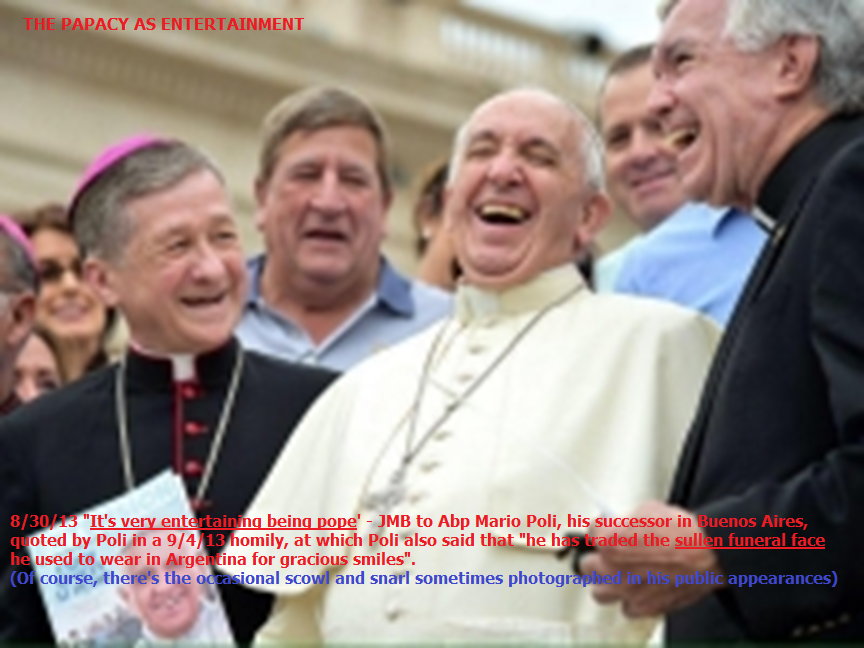 The photo accompanies Ferrara's article with the simple caption: 'Francis to Cardinal Poli: “It’s very entertaining to be pope!"' But since I have a very vivid recollection of the UK Telegraph story in Sept 2014 where Poli said that, I have added a more complete caption on the photo with additional context.
The photo accompanies Ferrara's article with the simple caption: 'Francis to Cardinal Poli: “It’s very entertaining to be pope!"' But since I have a very vivid recollection of the UK Telegraph story in Sept 2014 where Poli said that, I have added a more complete caption on the photo with additional context.
As his pontificate nears its fourth anniversary, Pope Francis ever more clearly reveals
a megalomaniacal conviction that the Church and her teaching are his to remake as he sees fit.
[It's not just the teachings he's been looking to remake, but as I have often said ad nauseam already, he is really building the church of Bergoglio on the back of the Roman Catholic Church. He has been busily wreckovating with a vengeance, taking advantage of the Church's bimillenary institutions -including the very Papacy itself - and infrastructure for maximum convenience and immediate effect. Martin Luther was only an ordinary Augustinian monk, not pope - yet he brought about Protestantism in a couple of decades but which has continually proliferated so that today, it has 33,000-and-counting denominations.
Bergoglio is the first de-facto apostate pope in the church's history, which is worse than heretical. Yet he cannot formally apostasize without giving up all the built-in broad and far-reaching powers he has as pope, whereby he has been setting up his apostate church in the 'protective' shelter and using the existing institutions and infrastructure of the one true Church of Christ. I still think that is the most accurate description of what he has done so far.
An added wrinkle in recent days is that the church of Bergoglio would appear to be simply the prototype for a one-world secular religion he may well be in the process of establishing, far beyond the wildest imaginings of someone like Hans Kueng who has been pushing this idea for decades. So, will Bergoglio go down in history as the first Roman Catholic pope who apostasized but also founded and led a one-world secular religion? Who knew last March 13, 2013, that in less than four years we would get to this point?
Praising his own rather absurdly denominated “Apostolic” Exhortation opening the door to Holy Communion for public adulterers, Francis told the Jesuit general congregation gathered in Rome last October that
Amoris Laetitia represents nothing less than a radical change in the Church’s view of “the whole moral sphere,” which at the time he was a seminarian “was restricted to ‘you can,’ ‘you cannot,’ ‘up to here, yes, but not there.’ It was a morality very foreign to discernment.” [The one great advantage of a hyperloquacious pope, who apparently cannot hear enough of his own voice, is that everytime he opens his mouth, he is spooling out more rope to hang himself, and one does not have to paraphrase him on anything - his exact words are preserved for infernal eternity.]
By “morality very foreign to discernment,” Francis means the moral teaching of the Church for 2,000 years before his unexpected arrival in Rome, including his time as a seminarian.
By “discernment” he means the utter novelty in moral theology he himself introduced in Chapter VIII of AL: a form of situation ethics he has thus far applied only to sexual activity outside of marriage.
He dares to attribute his situational sexual ethic to St. Thomas Aquinas and St. Bonaventure, who, according to him, “affirm that general principle holds for all but —they say it explicitly —a s one moves to the particular, the question becomes diversified and many nuances arise without changing the principle.”
Like so much of what Pope Bergoglio says, this is false and misleading. In the
Summa Theologiae (I-II, Q. 94, Art. 4), Saint Thomas observes that while “the natural law, as to general principles, is the same for all, both as to rectitude and as to knowledge” when it comes “to certain matters of detail… in some few cases it may fail, both as to rectitude… and as to knowledge, since in some the reason is perverted by passion, or evil habit, or an evil disposition of nature; thus formerly, theft, although it is expressly contrary to the natural law, was not considered wrong among the Germans, as Julius Caesar relates.”
What Saint Thomas describes as a failure of reason that produces immoral outcomes arising from passion, evil habit or disposition in “some few cases,” Francis elevates to a new standard of moral accountability in matters sexual. While the ancient Germans thought theft was morally permissible, Francis would now have us believe that the Sixth Commandment has a “diversified” application according to the circumstances of the adultery.
Like a river overflowing its banks and causing devastation to the surrounding countryside, the overflowing Bergoglian megalomania threatens to undermine not only the infallible teaching of the Church on the intrinsic evil of adulterous sexual relations but also her infallible condemnation of the intrinsic evil of contraception.
During the same meeting with his fellow Jesuit subversives, Bergoglio declared that Father Bernard Häring, the suit-and-tie Modernist “theologian” who infamously dissented from
Humanae Vitae, “was the first to start looking for a new way to help moral theology to flourish again.”
That is, with his novelty of “discernment,” Francis sees himself as the savior of Catholic moral theology regarding sexuality. For him, “discernment is the key element: the capacity for discernment.” Otherwise, “we run the risk of getting used to ‘white or black,’ to that which is legal.”
Thus we have a Pope for whom there is no clear black or white, right or wrong, when it comes to sexual behavior yet nothing but black and white, right and wrong, when it comes to such contingent and eminently debatable matters as national immigration policy or “climate change.”
Moreover, Francis insists that the entire Church be made conformable to his new standard of sexual morality, beginning with all priests in formation:
[B “One thing is clear: today, in a certain number of seminaries, a rigidity that is far from a discernment of situations has been introduced. And that is dangerous, because it can lead us to a conception of morality that has a casuistic sense.”
And what is this “rigidity that is far from a discernment of situations”? Nothing other than the constant moral teaching of the Church as opposed to Bergoglian “discernment.”
Indeed, it is the very same teaching Bergoglio himself encountered when he was a seminarian. But what the Church has always taught is not to be allowed in Bergoglian seminaries, where “discernment” is now to be the master word governing moral theology.
For as Francis declared only days ago: “This is the time of discernment in the church and the world.” Francis sees his arrival in Rome as an event that marks the dawning of a new moral age.
This megalomaniacal conviction that he can “make all things new
(Rev. 21:5)” is hardly confined to the sphere of sexual morality, however. Recall the Bergoglian “dream” enunciated the manifesto
Evangelii Gaudium:
“I dream of… a missionary impulse capable of transforming everything, so that the Church’s customs, ways of doing things, times and schedules, language and structures can be suitably channeled for the evangelization of today’s world rather than for her self-preservation.” Note the megalomaniacal opposition between Francis’s dream and the Church’s self-preservation.
It now appears that not even the infallible teaching against women’s ordination is safe from the “dream.” Francis seemed to uphold that teaching during one of his airborne press conferences: “For the ordination of women in the Catholic Church, the last clear word was given by Saint John Paul II, and this holds.”
Evidently, however, “the last clear word” is not to be understood as simply “the last word.” Looming into view only days ago was a trial balloon the size of a zeppelin concerning women priests. In an article in
La Civiltà Cattolica, the Jesuit magazine vetted by the Holy See and edited by Bergoglio’s “mouthpiece,” Antonio Spadaro, S.J., deputy editor Giancarlo Pani, another Modernist Jesuit, openly challenges the clearly infallible declaration by John Paul II in
Ordinatio Sacerdotalis that
the Church “has no authority whatsoever to confer priestly ordination on women and that this judgment is to be definitively held by all the Church’s faithful.”
But Pani declares:
In the judgment of ‘La Civiltà Cattolica,’ therefore, not only should the infallibility and definitiveness of John Paul II’s “no” to women priests be brought into doubt, but more important than this “no” are the developments that the presence of woman in the family and society has undergone in the 21st century….
One cannot always resort to the past, as if only in the past are there indications of the Spirit. Today as well the Spirit is guiding the Church and suggesting the courageous assumption of new perspectives.
It is surely Francis who has launched this zeppelin. As Pani concludes,
Francis “is the first not to limit himself to what is already known, but wants to delve into a complex and relevant field, so that it may be the Spirit who guides the Church.”
Leaving no doubt of his approval of Pani’s attack on a dogma regarding the sacred priesthood, days later Francis addressed the staff of
La Civiltà Cattolica, ostentatiously praising them in public “for having faithfully accompanied all the fundamental passages of my pontificate.”
During the same gathering, Francis shared with his fellow Jesuits more of the
[REALLY YUKKKKK!] Modernist nonsense that characterizes, incredibly enough, what is increasingly revealed to be a radically anti-Catholic pontificate:
[There, Ferrara has now openly used the word I have been using for the past few months to characterize Bergoglio and his pontificate.]
“Remain in the open sea! A Catholic must not have fear of the open sea, nor should she or he seek the shelter of safe ports….”
“Above all, as Jesuits you must avoid clinging to the certainties and securities. The Lord calls you to go out on mission, to go to the deep and not to go on pension to protect certainties.”
“Only restlessness will give peace to the heart of a Jesuit…”
“If you wish to inhabit bridges and frontiers, you have to have a restless mind and heart”
“Be writers and journalists of an ‘incomplete’ thinking, that is open, and not closed or rigid. Your faith opens your thinking. Be guided by the prophetic spirit of the Gospel to have an original vision, that is alive, dynamic, not obvious[!]”
“Rigid thinking is not divine because Jesus assumed our flesh which is not rigid, except at the moment of death.”
What can one say about a theologically dilettantish Pope who publicly belittles “obvious” theology, seriously calls for “incomplete thinking,” likens uncompromising orthodoxy to the rigor mortis of a corpse, and feels no compunction about subverting the Church’s infallible teaching on faith and morals? How are we to confront this ever-worsening mockery of a papacy?
That we have a duty to speak our mind in opposition to this destructive pontificate cannot be doubted, and more and more Catholics are doing so publicly and even harshly. And at this point one is tempted to think that sheer mockery is the only effective form of opposition to a Pope who has ignored all respectful entreaties, even from cardinals. Perhaps mocking the mockery is all that is left to us.
Hence we have seen in recent days derisive posters of Francis plastered all over Rome and a parody of L’Osservatore Romano emailed to cardinals, bishops and Vatican personnel, wherein Francis finally responds to the dubia of the four cardinals by answering “Yes and No” to each question.
But aside from the august dignity of the papal office, as to which mockery can hardly be fitting
[BUT NO ONE IS MOCKING THE OFFICE - ONE IS MOCKING THE UNWORTHY OFFICEHOLDER!], I don’t think mockery will do any good even if it might alleviate our angst on a base emotional level.
For it seems to me that the most charitable explanation of this pontificate —nay, the only charitable explanation — is that
Jorge Mario Bergoglio is suffering from a delusional disorder that renders him immune to any form of criticism.
By this I mean “one or more non-bizarre delusions of thinking” of a “grandiose type” that involves “some… special relationship with… God ”— in this case, the “god of surprises” who is really the alter ego of Francis, acting in a feedback loop of self-delusion that produces a state of subjective certitude and even calm.
Such a delusion of grandeur would not be incompatible with the violent outbursts of temper Bergoglio has exhibited, for with delusional disorders “mood episodes are relatively brief compared with the total duration of the delusional periods.”
And there we have it, I believe.
Only a delusional disorder would explain how a man who is provoking dissent, disorder and division throughout the Church like no other Pope in Church history, while scheming and plotting the systematic neutralization of his orthodox critics, can (as he recently revealed) sleep peacefully every night, write pious letters to Saint Joseph about his problems, and maintain “a healthy ‘couldn’t care less’ attitude” while experiencing “a very particular feeling of profound peace… that has never left me.”
So how do we confront this mockery of a papacy? By constant prayers for the Pope and the Church, of course, but also by a constant public defense of the truth against the many errors of the Bergoglian faux Magisterium of informal remarks, winks and nods, and documents deliberately written to say Yes and No at the same time, while their author observes a stony silence in response to respectful questions about what he really means — as if we didn’t know!
But
let no one think Francis can be shamed into changing his course by mockery or any other form of criticism. Delusions know no shame. “I am at peace. I don’t know how to explain it,” says the man from Argentina. And neither do we, save for the explanation that he is profoundly delusional.
Either that, or orthodox Catholics are all delusional for thinking that the doctrines of the Faith, revealed by Christ and the Apostles and preserved intact for two millennia by the Church’s Magisterium and discipline, are immutable truths not even a Pope can alter.
Which alternative seems more probable to you, dear reader?